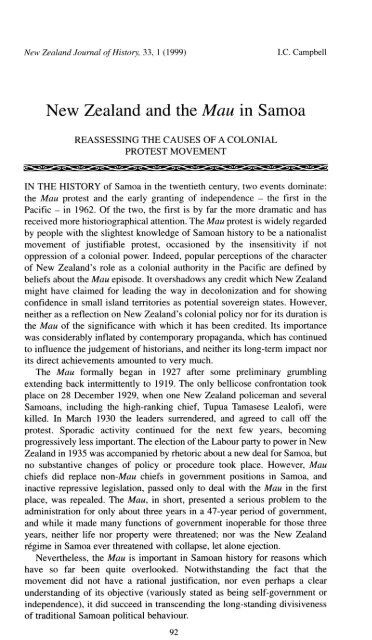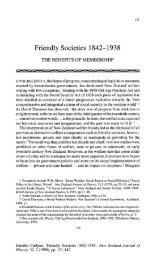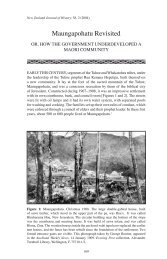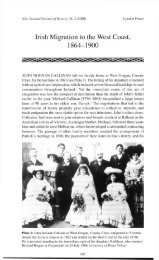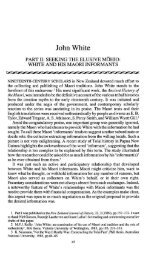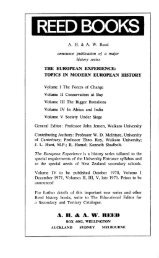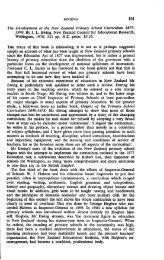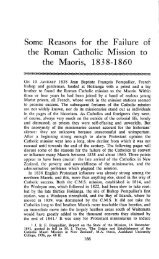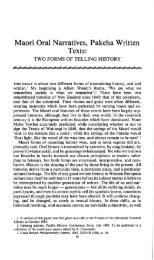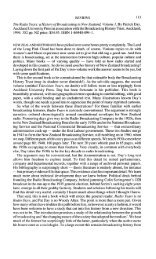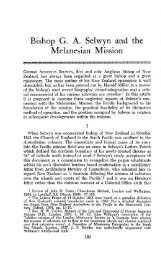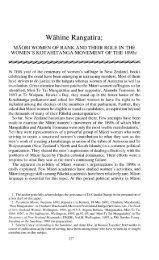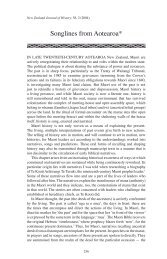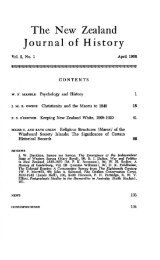New Zealand and the Mau in Samoa - New Zealand Journal of History
New Zealand and the Mau in Samoa - New Zealand Journal of History
New Zealand and the Mau in Samoa - New Zealand Journal of History
You also want an ePaper? Increase the reach of your titles
YUMPU automatically turns print PDFs into web optimized ePapers that Google loves.
<strong>New</strong> <strong>Zeal<strong>and</strong></strong> <strong>Journal</strong> <strong>of</strong> <strong>History</strong>, 33,1(1999)<br />
I.C. Campbell<br />
<strong>New</strong> <strong>Zeal<strong>and</strong></strong> <strong>and</strong> <strong>the</strong> <strong>Mau</strong> <strong>in</strong> <strong>Samoa</strong><br />
REASSESSING THE CAUSES OF A COLONIAL<br />
PROTEST MOVEMENT<br />
IN THE HISTORY <strong>of</strong> <strong>Samoa</strong> <strong>in</strong> <strong>the</strong> twentieth century, two events dom<strong>in</strong>ate:<br />
<strong>the</strong> <strong>Mau</strong> protest <strong>and</strong> <strong>the</strong> early grant<strong>in</strong>g <strong>of</strong> <strong>in</strong>dependence - <strong>the</strong> first <strong>in</strong> <strong>the</strong><br />
Pacific - <strong>in</strong> 1962. Of <strong>the</strong> two, <strong>the</strong> first is by far <strong>the</strong> more dramatic <strong>and</strong> has<br />
received more historiographical attention. The <strong>Mau</strong> protest is widely regarded<br />
by people with <strong>the</strong> slightest knowledge <strong>of</strong> <strong>Samoa</strong>n history to be a nationalist<br />
movement <strong>of</strong> justifiable protest, occasioned by <strong>the</strong> <strong>in</strong>sensitivity if not<br />
oppression <strong>of</strong> a colonial power. Indeed, popular perceptions <strong>of</strong> <strong>the</strong> character<br />
<strong>of</strong> <strong>New</strong> <strong>Zeal<strong>and</strong></strong>'s role as a colonial authority <strong>in</strong> <strong>the</strong> Pacific are def<strong>in</strong>ed by<br />
beliefs about <strong>the</strong> <strong>Mau</strong> episode. It overshadows any credit which <strong>New</strong> <strong>Zeal<strong>and</strong></strong><br />
might have claimed for lead<strong>in</strong>g <strong>the</strong> way <strong>in</strong> decolonization <strong>and</strong> for show<strong>in</strong>g<br />
confidence <strong>in</strong> small isl<strong>and</strong> territories as potential sovereign states. However,<br />
nei<strong>the</strong>.r as a reflection on <strong>New</strong> <strong>Zeal<strong>and</strong></strong>'s colonial policy nor for its duration is<br />
<strong>the</strong> <strong>Mau</strong> <strong>of</strong> <strong>the</strong> significance with which it has been credited. Its importance<br />
was considerably <strong>in</strong>flated by contemporary propag<strong>and</strong>a, which has cont<strong>in</strong>ued<br />
to <strong>in</strong>fluence <strong>the</strong> judgement <strong>of</strong> historians, <strong>and</strong> nei<strong>the</strong>r its long-term impact nor<br />
its direct achievements amounted to very much.<br />
The <strong>Mau</strong> formally began <strong>in</strong> 1927 after some prelim<strong>in</strong>ary grumbl<strong>in</strong>g<br />
extend<strong>in</strong>g back <strong>in</strong>termittently to 1919. The only bellicose confrontation took<br />
place on 28 December 1929, when one <strong>New</strong> <strong>Zeal<strong>and</strong></strong> policeman <strong>and</strong> several<br />
<strong>Samoa</strong>ns, <strong>in</strong>clud<strong>in</strong>g <strong>the</strong> high-rank<strong>in</strong>g chief, Tupua Tamasese Leal<strong>of</strong>i, were<br />
killed. In March 1930 <strong>the</strong> leaders surrendered, <strong>and</strong> agreed to call <strong>of</strong>f <strong>the</strong><br />
protest. Sporadic activity cont<strong>in</strong>ued for <strong>the</strong> next few years, becom<strong>in</strong>g<br />
progressively less important. The election <strong>of</strong> <strong>the</strong> Labour party to power <strong>in</strong> <strong>New</strong><br />
<strong>Zeal<strong>and</strong></strong> <strong>in</strong> 1935 was accompanied by rhetoric about a new deal for <strong>Samoa</strong>, but<br />
no substantive changes <strong>of</strong> policy or procedure took place. However, <strong>Mau</strong><br />
chiefs did replace non-<strong>Mau</strong> chiefs <strong>in</strong> government positions <strong>in</strong> <strong>Samoa</strong>, <strong>and</strong><br />
<strong>in</strong>active repressive legislation, passed only to deal with <strong>the</strong> <strong>Mau</strong> <strong>in</strong> <strong>the</strong> first<br />
place, was repealed. The <strong>Mau</strong>, <strong>in</strong> short, presented a serious problem to <strong>the</strong><br />
adm<strong>in</strong>istration for only about three years <strong>in</strong> a 47-year period <strong>of</strong> government,<br />
<strong>and</strong> while it made many functions <strong>of</strong> government <strong>in</strong>operable for those three<br />
years, nei<strong>the</strong>r life nor property were threatened; nor was <strong>the</strong> <strong>New</strong> <strong>Zeal<strong>and</strong></strong><br />
regime <strong>in</strong> <strong>Samoa</strong> ever threatened with collapse, let alone ejection.<br />
Never<strong>the</strong>less, <strong>the</strong> <strong>Mau</strong> is important <strong>in</strong> <strong>Samoa</strong>n history for reasons which<br />
have so far been quite overlooked. Notwithst<strong>and</strong><strong>in</strong>g <strong>the</strong> fact that <strong>the</strong><br />
movement did not have a rational justification, nor even perhaps a clear<br />
underst<strong>and</strong><strong>in</strong>g <strong>of</strong> its objective (variously stated as be<strong>in</strong>g self-government or<br />
<strong>in</strong>dependence), it did succeed <strong>in</strong> transcend<strong>in</strong>g <strong>the</strong> long-st<strong>and</strong><strong>in</strong>g divisiveness<br />
<strong>of</strong> traditional <strong>Samoa</strong>n political behaviour.<br />
92
NEW ZEALAND AND THE MAU 93<br />
Throughout <strong>the</strong> period <strong>of</strong> its contact with Europeans, attempts to stabilize<br />
<strong>Samoa</strong>n politics had foundered on <strong>the</strong> same shoal: that <strong>Samoa</strong>n politics was a<br />
never-resolved contest between a victorious party <strong>and</strong> a vanquished one. As<br />
<strong>in</strong> Westm<strong>in</strong>ster electoral politics, <strong>the</strong>re was always a strong party (<strong>the</strong> malo),<br />
which enjoyed status <strong>and</strong> power, <strong>and</strong> a weak party (<strong>the</strong> vaivai), which was<br />
humiliated, powerless <strong>and</strong> resentful. The membership <strong>of</strong> both groups was<br />
fluid, <strong>and</strong> <strong>the</strong> vaivai conspired constantly to overthrow <strong>the</strong> malo, to become,<br />
<strong>in</strong> <strong>the</strong>ir turn, <strong>the</strong> malo. All attempts to establish unitary, stable governments<br />
between 1866 <strong>and</strong> 1899 had come to grief <strong>in</strong> civil war as <strong>the</strong> weak party<br />
sought to overthrow <strong>the</strong> strong. 1 Fluid though <strong>the</strong> political group<strong>in</strong>gs were, <strong>the</strong><br />
major titles <strong>of</strong> rank were affiliated with one or o<strong>the</strong>r <strong>of</strong> two sets <strong>of</strong> orator titles<br />
called Tumua <strong>and</strong> Pule respectively. The orators were <strong>the</strong> real power <strong>in</strong><br />
<strong>Samoa</strong>: <strong>the</strong>y were <strong>the</strong> ones who negotiated, exhorted, <strong>and</strong> made deals; it was<br />
<strong>the</strong>y, ra<strong>the</strong>r than <strong>the</strong> holders <strong>of</strong> <strong>the</strong> titles <strong>of</strong> rank, who possessed <strong>the</strong> <strong>in</strong>timate<br />
knowledge <strong>of</strong> history <strong>and</strong> genealogy which allowed <strong>the</strong>m to manipulate<br />
claims for titles <strong>and</strong> who could arrange alliances. Fundamentally, it was <strong>the</strong><br />
unwill<strong>in</strong>gness <strong>of</strong> <strong>the</strong> orator-chiefs to surrender <strong>the</strong>ir powers which made <strong>the</strong><br />
n<strong>in</strong>eteenth-century experiments <strong>in</strong> government unworkable.<br />
Likewise, <strong>the</strong> orator groups <strong>of</strong> Tumua <strong>and</strong> Pule were <strong>the</strong> ma<strong>in</strong> obstacles to<br />
<strong>the</strong> consolidation <strong>of</strong> power by <strong>the</strong> German colonial regime between 1900 <strong>and</strong><br />
1914. Governor Wilhelm Solf recognized that <strong>the</strong> modernization <strong>of</strong> <strong>Samoa</strong><br />
depended on break<strong>in</strong>g <strong>the</strong> power <strong>of</strong> Tumua <strong>and</strong> Pule, <strong>and</strong> similarly, Tumua or<br />
Pule were beh<strong>in</strong>d each <strong>of</strong> <strong>the</strong> <strong>Samoa</strong>n attempts to throw <strong>of</strong>f German power. 2<br />
The power <strong>of</strong> Tumua <strong>and</strong> Pule was, however, only suppressed, not broken, by<br />
<strong>the</strong> German regime. Until it could be broken, or sublimated <strong>in</strong> a form <strong>of</strong><br />
democratic party politics, <strong>the</strong> modernization <strong>of</strong> <strong>Samoa</strong>n politics could never<br />
happen. Leav<strong>in</strong>g aside for <strong>the</strong> moment <strong>the</strong> question <strong>of</strong> whe<strong>the</strong>r <strong>New</strong> <strong>Zeal<strong>and</strong></strong><br />
could have broken or did break <strong>the</strong> power <strong>of</strong> <strong>the</strong> orator groups, <strong>the</strong><br />
achievement <strong>of</strong> <strong>the</strong> <strong>Mau</strong> was to transcend <strong>the</strong>m. Under foreign government<br />
almost all chiefs, whe<strong>the</strong>r orators or not, became vaivai <strong>in</strong>s<strong>of</strong>ar as <strong>the</strong>y were<br />
made subord<strong>in</strong>ate. Hence, whatever else it failed to achieve, <strong>the</strong> <strong>Mau</strong> drew<br />
<strong>the</strong>m all toge<strong>the</strong>r, so that when, after <strong>the</strong> Second World War, <strong>New</strong> <strong>Zeal<strong>and</strong></strong><br />
placed decolonization on <strong>the</strong> political agenda, <strong>the</strong> cont<strong>in</strong>u<strong>in</strong>g rivalry <strong>of</strong> Tumua<br />
<strong>and</strong> Pule was not <strong>the</strong>re to hijack <strong>the</strong> process or underm<strong>in</strong>e <strong>the</strong> viability <strong>of</strong><br />
post-<strong>in</strong>dependence government.<br />
Most attempts to expla<strong>in</strong> <strong>the</strong> orig<strong>in</strong> <strong>of</strong> <strong>the</strong> <strong>Mau</strong> overlook <strong>the</strong> implications<br />
<strong>of</strong> <strong>the</strong> malo-vaivai division, <strong>and</strong> <strong>the</strong> rivalries <strong>of</strong> <strong>the</strong> orator-chiefs <strong>of</strong> Tumua<br />
<strong>and</strong> Pule. These traditional political categories, however, made protest<br />
movements (whe<strong>the</strong>r violent upris<strong>in</strong>gs or more muted opposition) aga<strong>in</strong>st any<br />
government virtually <strong>in</strong>evitable. <strong>Samoa</strong>ns did not need to be misgoverned <strong>in</strong><br />
order to rise <strong>in</strong> protest; it was only necessary that <strong>the</strong>re be a government, <strong>and</strong><br />
1 R.P. Gilson, <strong>Samoa</strong> 1830-1900. The Politics <strong>of</strong> a Multi-Cultural Community. Melbourne,<br />
1970, pp.260 ff <strong>and</strong> ch.13.<br />
2 [Wilhelm Solf], Report for <strong>the</strong> German Colonial Office November 1907, TS copy, Rhodes<br />
House Library, Oxford. Also Malama Meleisea, The Mak<strong>in</strong>g <strong>of</strong> Modern <strong>Samoa</strong>, Suva, 1987,<br />
pp.50, 53, 87, 102.
94 I.e. CAMPBELL<br />
whe<strong>the</strong>r it was a foreign government or a <strong>Samoa</strong>n government was scarcely<br />
material. However, when <strong>the</strong> malo was foreign, <strong>the</strong> vaivai was bound, sooner<br />
or later, to <strong>in</strong>clude most <strong>Samoa</strong>ns. Indeed, exam<strong>in</strong>ed superficially, this is not<br />
very different from <strong>the</strong> situation to be found wherever a country is under<br />
foreign occupation: patriots will consider it <strong>the</strong>ir duty to eject <strong>the</strong> foreign<br />
governor, regardless <strong>of</strong> his policies or merits, <strong>and</strong> <strong>the</strong> patriotic movement will<br />
<strong>in</strong>clude representatives <strong>of</strong> different classes, factions <strong>and</strong> <strong>in</strong>terest groups who<br />
would ord<strong>in</strong>arily have noth<strong>in</strong>g <strong>in</strong> common, <strong>and</strong> might even be at open enmity.<br />
A common enemy engenders a convenient if ephemeral unity. As to what<br />
<strong>Samoa</strong>ns 'really' thought about <strong>the</strong> character <strong>of</strong> <strong>New</strong> <strong>Zeal<strong>and</strong></strong> rule, it is<br />
impossible to say because <strong>Samoa</strong>n society was strictly aristocratic, even<br />
authoritarian. Ins<strong>of</strong>ar as '<strong>Samoa</strong>n' op<strong>in</strong>ion is known, it is <strong>Samoa</strong>n chiefly<br />
op<strong>in</strong>ion; <strong>and</strong> when chiefs compla<strong>in</strong>ed <strong>of</strong> misrule, it need not signify hardship<br />
or oppression where <strong>the</strong> people at large were concerned. Indeed, it might<br />
mean <strong>the</strong> contrary if chiefly values <strong>and</strong> status were be<strong>in</strong>g called <strong>in</strong>to question.<br />
The <strong>Samoa</strong>n chiefs, like most people elsewhere, never preferred foreign rule. 3<br />
While <strong>the</strong>y accepted it <strong>and</strong> acknowledged it, <strong>and</strong> at times expressed <strong>the</strong>ir<br />
appreciation for it, or even <strong>the</strong>ir preference for one (potential) foreign ruler<br />
over ano<strong>the</strong>r (actual) one, <strong>the</strong>re was never a time when <strong>the</strong>y would not have<br />
preferred to be ruled by <strong>the</strong>mselves. The presence <strong>of</strong> this feel<strong>in</strong>g is not<br />
evidence <strong>of</strong> misrule, nor is <strong>the</strong> <strong>Mau</strong> evidence that <strong>New</strong> <strong>Zeal<strong>and</strong></strong>'s actual<br />
management <strong>of</strong> <strong>the</strong> <strong>Samoa</strong>ns was any worse than <strong>the</strong> alternatives, <strong>in</strong>digenous<br />
or foreign. 4<br />
The scene is set, <strong>the</strong>refore, to consider two questions: first, whe<strong>the</strong>r<br />
<strong>Samoa</strong>ns showed a tendency to revolt under colonial government generally,<br />
<strong>and</strong> second, whe<strong>the</strong>r <strong>the</strong>y were misgoverned under <strong>the</strong> <strong>New</strong> <strong>Zeal<strong>and</strong></strong><br />
m<strong>and</strong>ate. When Western <strong>Samoa</strong> first came under imperial rule, that <strong>of</strong><br />
Germany <strong>in</strong> 1900, <strong>Samoa</strong>ns might have thought that this was merely <strong>the</strong><br />
latest <strong>of</strong> a series <strong>of</strong> foreign <strong>in</strong>terventions <strong>in</strong> <strong>Samoa</strong>'s turbulent politics,<br />
although contemporary speeches <strong>in</strong>dicate that <strong>the</strong>y understood that authority<br />
had been transferred permanently out <strong>of</strong> <strong>the</strong>ir h<strong>and</strong>s. 5 Attempts to reject<br />
German rule were not long <strong>in</strong> com<strong>in</strong>g. In 1904 tentative claims to greater<br />
status <strong>and</strong> authority for <strong>the</strong> highest chiefs were made, <strong>and</strong> <strong>in</strong> 1905 more<br />
assertiveness was shown <strong>in</strong> break<strong>in</strong>g two chiefs out <strong>of</strong> gaol. Settlers claimed<br />
that <strong>the</strong>y feared an <strong>in</strong>digenous upris<strong>in</strong>g. The governor's response was<br />
<strong>in</strong>tended to let <strong>the</strong> chiefs know that <strong>the</strong>re could be no doubt about who was<br />
<strong>in</strong> charge <strong>of</strong> <strong>Samoa</strong>. Three years later a more serious upris<strong>in</strong>g occurred. This<br />
3 Cf H.J. Hiery, The Neglected War. The German South Pacific <strong>and</strong> <strong>the</strong> Influence <strong>of</strong> World War<br />
1. Honolulu, 1995, p. 196, who asserts that <strong>Samoa</strong>ns came to terms with German rule, <strong>and</strong> that a<br />
measure <strong>of</strong> <strong>Samoa</strong>n-German sympathy developed <strong>in</strong> <strong>the</strong> short 14-year regime.<br />
4 Cf. however, <strong>the</strong> op<strong>in</strong>ion <strong>of</strong> <strong>the</strong> American anthropologist Dr Douglas Oliver, who visited<br />
Western <strong>Samoa</strong> <strong>in</strong> 1943 as leader <strong>of</strong> a mission from <strong>the</strong> Board <strong>of</strong> Economic Warfare <strong>and</strong><br />
considered that Western <strong>Samoa</strong>ns were <strong>the</strong> happiest <strong>and</strong> best adm<strong>in</strong>istered people <strong>in</strong> <strong>the</strong> Pacific<br />
<strong>and</strong> that <strong>the</strong> government had been 'markedly successful'. Isl<strong>and</strong> Territories (IT) 11 Turnbull File,<br />
5 June 1943, National Archives, Well<strong>in</strong>gton. All subsequent <strong>of</strong>ficial archival references are to <strong>the</strong><br />
National Archives.<br />
5 F.Kees<strong>in</strong>g, Modern <strong>Samoa</strong>, London, 1934, p.86.
NEW ZEALAND AND THE MAU 95<br />
was <strong>the</strong> <strong>Mau</strong> a Pule, <strong>the</strong> <strong>in</strong>tention <strong>of</strong> which was to replace German rule with<br />
<strong>the</strong> former <strong>Samoa</strong>n government, <strong>and</strong> <strong>in</strong> 1909 an armed force advanced on <strong>the</strong><br />
capital, Apia, from Savai'i. The affair did not f<strong>in</strong>ally end until Solf called <strong>in</strong><br />
warships <strong>and</strong> had <strong>the</strong> leaders exiled to <strong>the</strong> Carol<strong>in</strong>e Isl<strong>and</strong>s. O<strong>the</strong>r<br />
punishments <strong>in</strong>cluded f<strong>in</strong>es, imprisonment, l<strong>and</strong> confiscation, <strong>the</strong> abolition<br />
<strong>of</strong> certa<strong>in</strong> <strong>Samoa</strong>n titles, <strong>and</strong> <strong>the</strong> suspension <strong>of</strong> native <strong>Samoa</strong>n <strong>of</strong>ficials. The<br />
response was both punitive <strong>and</strong> exemplary, <strong>and</strong> Solf's proclamation at <strong>the</strong><br />
time warned <strong>the</strong> <strong>Samoa</strong>ns, 'you will underst<strong>and</strong> that it is my love for you that<br />
has made me punish you so lightly'. 6 After that, discontent dared not show<br />
itself openly, but German rule was to last only ano<strong>the</strong>r five years, <strong>and</strong> <strong>the</strong>re<br />
is no reason to th<strong>in</strong>k that <strong>the</strong> <strong>Samoa</strong>ns would have let matters rest<br />
<strong>in</strong>def<strong>in</strong>itely.<br />
The neighbour<strong>in</strong>g American territory <strong>of</strong> <strong>the</strong> eastern isl<strong>and</strong>s <strong>of</strong> <strong>Samoa</strong> was<br />
only superficially more tractable. Because Tutuila <strong>and</strong> Manu'a were<br />
marg<strong>in</strong>al to <strong>Samoa</strong>n national politics, <strong>the</strong> regime established by <strong>the</strong> United<br />
States navy <strong>in</strong> eastern <strong>Samoa</strong> did not face <strong>the</strong> same difficulties or challenges<br />
as <strong>the</strong> Germans did <strong>in</strong> <strong>the</strong> west. In 1902 signs <strong>of</strong> protest on Manu'a, which<br />
actually arose from an <strong>in</strong>tra-<strong>Samoa</strong>n dispute, were described as a 'm<strong>in</strong>or<br />
rebellion', but almost 20 years passed before a more serious challenge to<br />
foreign authority arose: <strong>in</strong> April 1920 <strong>the</strong> chiefs <strong>of</strong> Tutuila formed a <strong>Mau</strong> <strong>and</strong><br />
brought <strong>the</strong> work <strong>of</strong> government to a st<strong>and</strong>still. The Americans acted firmly,<br />
br<strong>in</strong>g<strong>in</strong>g <strong>in</strong> a battleship <strong>and</strong> gaol<strong>in</strong>g 19 chiefs, after which <strong>the</strong> movement<br />
appeared to disb<strong>and</strong>, 7 but it recurred at various levels <strong>of</strong> seriousness for <strong>the</strong><br />
next decade. 8 This all took place when comparisons unfavourable to <strong>New</strong><br />
<strong>Zeal<strong>and</strong></strong> were be<strong>in</strong>g made between <strong>the</strong> adm<strong>in</strong>istrations <strong>of</strong> American <strong>and</strong><br />
Western <strong>Samoa</strong>. 9 Later historians who trace <strong>the</strong> Western <strong>Samoa</strong>n <strong>Mau</strong> to<br />
feel<strong>in</strong>gs <strong>of</strong> resentment over <strong>the</strong> contrast between <strong>the</strong> terrible losses <strong>in</strong> <strong>the</strong><br />
1918 <strong>in</strong>fluenza epidemic <strong>in</strong> Western <strong>Samoa</strong>'" <strong>and</strong> <strong>the</strong> effective quarant<strong>in</strong>e <strong>in</strong><br />
American <strong>Samoa</strong>, have overlooked <strong>the</strong> fact that both regimes faced similar<br />
<strong>Mau</strong> dur<strong>in</strong>g <strong>the</strong> 1920s. Indeed, <strong>the</strong> <strong>Mau</strong> <strong>in</strong> American <strong>Samoa</strong> predated that <strong>in</strong><br />
Western <strong>Samoa</strong>, although <strong>in</strong> o<strong>the</strong>r respects <strong>the</strong> two movements were<br />
remarkably similar.<br />
In expla<strong>in</strong><strong>in</strong>g <strong>the</strong> <strong>Mau</strong> <strong>in</strong> Western <strong>Samoa</strong>, <strong>the</strong>refore, a comparison with <strong>the</strong><br />
two o<strong>the</strong>r regimes leads to two alternative hypo<strong>the</strong>ses. Ei<strong>the</strong>r <strong>the</strong> protest was<br />
<strong>in</strong>dependent <strong>of</strong> <strong>the</strong> character <strong>of</strong> foreign rule, or all three regimes engaged <strong>in</strong><br />
similarly repressive policies. Ei<strong>the</strong>r way, it does not follow that <strong>New</strong> <strong>Zeal<strong>and</strong></strong><br />
got <strong>in</strong>to difficulties because <strong>of</strong> <strong>the</strong> exceptional clums<strong>in</strong>ess or <strong>in</strong>eptness <strong>of</strong> its<br />
6 Kees<strong>in</strong>g, p.92.<br />
7 Prime M<strong>in</strong>ister <strong>of</strong> <strong>New</strong> <strong>Zeal<strong>and</strong></strong> to Governor-General, 19 August 1922, IT1 Ex 2/9.<br />
8 Kees<strong>in</strong>g, pp. 133-6.<br />
9 Prime M<strong>in</strong>ister to Governor-General, 19 August 1922, IT1 Ex2/9.<br />
10 The mortality was <strong>in</strong> <strong>the</strong> order <strong>of</strong> 17-22%, <strong>the</strong> vary<strong>in</strong>g estimates reflect<strong>in</strong>g different<br />
assumptions <strong>in</strong> <strong>the</strong> calculations. See Norma MacArthur, Isl<strong>and</strong> Populations <strong>of</strong> <strong>the</strong> Pacific,<br />
Canberra, 1967, pp. 125-6: S<strong>and</strong>ra M. Tomk<strong>in</strong>s, 'Influenza Epidemic <strong>of</strong> 1918-19 <strong>in</strong> Western<br />
<strong>Samoa</strong>', <strong>Journal</strong> <strong>of</strong> Pacific <strong>History</strong>, 27 (1992), pp.181 -97; Mary Boyd, 'Cop<strong>in</strong>g with <strong>Samoa</strong>n<br />
Resistance after <strong>the</strong> 1918 Influenza Epidemic', <strong>Journal</strong> <strong>of</strong> Pacific <strong>History</strong>, 15 (1980),<br />
pp. 155-74.
96 I.e. CAMPBELL<br />
<strong>of</strong>ficials or policies. And yet that is what has been claimed by most scholars."<br />
On <strong>the</strong> contrary, <strong>the</strong> <strong>New</strong> <strong>Zeal<strong>and</strong></strong> adm<strong>in</strong>istration was liberal, its policies<br />
progressive, <strong>and</strong> its <strong>of</strong>ficials were sensitive to <strong>the</strong> needs <strong>and</strong> prejudices <strong>of</strong> <strong>the</strong><br />
<strong>Samoa</strong>ns, hav<strong>in</strong>g due regard to <strong>the</strong> spirit <strong>of</strong> <strong>the</strong> times. The years 1920 to 1926<br />
were years <strong>of</strong> active <strong>and</strong> enthusiastic experimentation <strong>in</strong> which form was<br />
given to <strong>New</strong> <strong>Zeal<strong>and</strong></strong>'s undertak<strong>in</strong>gs under <strong>the</strong> League <strong>of</strong> Nations' M<strong>and</strong>ate<br />
to promote '<strong>the</strong> well-be<strong>in</strong>g <strong>and</strong> development <strong>of</strong> <strong>the</strong> people'. 12<br />
The modernization programme was <strong>in</strong>itiated by Colonel Robert Tate who<br />
had taken over <strong>in</strong> 1919 from <strong>the</strong> war-time adm<strong>in</strong>istrator, <strong>the</strong> unfortunate<br />
Colonel Robert Logan, whose record <strong>in</strong> <strong>Samoa</strong> was blighted by <strong>the</strong> lapse <strong>in</strong><br />
quarant<strong>in</strong>e which permitted <strong>the</strong> <strong>in</strong>troduction <strong>of</strong> <strong>the</strong> fatal <strong>in</strong>fluenza scourge <strong>in</strong><br />
1918. While much <strong>of</strong> Tate's early activity was concerned with manag<strong>in</strong>g <strong>the</strong><br />
politics <strong>of</strong> relations with <strong>the</strong> <strong>Samoa</strong>ns, he vigorously pursued policies <strong>of</strong><br />
reconstruction <strong>and</strong> development. In 1921 <strong>the</strong> Medical Department was<br />
reorganized <strong>and</strong> a Division <strong>of</strong> Public Hygiene established. Nurse tra<strong>in</strong><strong>in</strong>g was<br />
undertaken <strong>and</strong> a three-year course for Native Medical Practitioners was<br />
begun; meanwhile an <strong>in</strong>ternational search was undertaken for specialists <strong>in</strong><br />
tropical medic<strong>in</strong>e. Plans were made for a district nurs<strong>in</strong>g scheme modelled on<br />
that <strong>of</strong> <strong>New</strong> <strong>Zeal<strong>and</strong></strong>, with particular attention to maternal <strong>and</strong> <strong>in</strong>fant health.<br />
Hospital attendances <strong>in</strong>creased as <strong>Samoa</strong>n confidence <strong>in</strong> western medic<strong>in</strong>e<br />
rose, <strong>and</strong> <strong>the</strong> <strong>Samoa</strong>n population <strong>in</strong>creased by about 6% <strong>in</strong> <strong>the</strong> first 18 months<br />
after <strong>the</strong> <strong>in</strong>fluenza epidemic.<br />
Tate was as vigorous <strong>in</strong> education, which was formerly conducted almost<br />
entirely by <strong>the</strong> Christian missions <strong>in</strong> unco-ord<strong>in</strong>ated efforts. He <strong>in</strong>itiated<br />
plans for a national system, appo<strong>in</strong>ted a super<strong>in</strong>tendent to <strong>in</strong>spect <strong>the</strong> mission<br />
schools, <strong>and</strong> arranged for <strong>in</strong>struction <strong>in</strong> teach<strong>in</strong>g methods to be provided for<br />
<strong>the</strong> untra<strong>in</strong>ed <strong>Samoa</strong>n teachers. He held an Education Conference <strong>of</strong><br />
<strong>in</strong>terested parties <strong>in</strong> December 1920 to make plans <strong>and</strong> canvass possibilities.<br />
This conference gave way to a Board <strong>of</strong> Education which <strong>in</strong>cluded two<br />
<strong>Samoa</strong>n members nom<strong>in</strong>ated by <strong>the</strong> Fono <strong>of</strong> Faipule. Cont<strong>in</strong>uation classes<br />
were set up so that <strong>Samoa</strong>ns could learn English, <strong>and</strong> Europeans could learn<br />
<strong>Samoa</strong>n, <strong>and</strong> as early as 1921 four <strong>Samoa</strong>n boys were selected for<br />
11 Hiery, chs 4, 5; Michael J. Field, <strong>Mau</strong>. <strong>Samoa</strong>'s Struggle aga<strong>in</strong>st <strong>New</strong> <strong>Zeal<strong>and</strong></strong> Oppression,<br />
Well<strong>in</strong>gton, 1984, especially chs 3, 5-7; Meleisea, chs 5, 6; J.W. Davidson, <strong>Samoa</strong> mo <strong>Samoa</strong>,<br />
Melbourne, 1967. pp. 108-13; Peter Hempenstall <strong>and</strong> Noel Ru<strong>the</strong>rford, Protest <strong>and</strong> Dissent <strong>in</strong> <strong>the</strong><br />
Colonial Pacific, Suva, 1984, pp.33-39. Mary Boyd. 'The Record <strong>in</strong> Western <strong>Samoa</strong> to 1945", <strong>in</strong><br />
Angus Ross, ed.. <strong>New</strong> <strong>Zeal<strong>and</strong></strong>'s Record <strong>in</strong> <strong>the</strong> Pacific <strong>in</strong> <strong>the</strong> Twentieth Century. Auckl<strong>and</strong>, 1969,<br />
pp.133, 153, though less critical <strong>of</strong> <strong>New</strong> <strong>Zeal<strong>and</strong></strong>, refers to misguided paternalism, ignorance <strong>and</strong><br />
misunderst<strong>and</strong><strong>in</strong>g.<br />
12 Article 22 <strong>of</strong> <strong>the</strong> Covenant <strong>of</strong> <strong>the</strong> League <strong>of</strong> Nations. It should be noted that <strong>New</strong> <strong>Zeal<strong>and</strong></strong><br />
colonialism was <strong>in</strong>formed by quite different values <strong>and</strong> objectives from that <strong>of</strong> most o<strong>the</strong>r<br />
powers, <strong>and</strong> <strong>in</strong>deed was different from that <strong>of</strong> <strong>the</strong> n<strong>in</strong>eteenth-century <strong>New</strong> <strong>Zeal<strong>and</strong></strong> propag<strong>and</strong>ists<br />
<strong>of</strong> colonial expansion. <strong>New</strong> <strong>Zeal<strong>and</strong></strong> <strong>in</strong>tentions <strong>and</strong> policies, on <strong>the</strong> whole, were perfectly <strong>in</strong><br />
accord with <strong>the</strong> ideals embodied <strong>in</strong> <strong>the</strong> League <strong>of</strong> Nations m<strong>and</strong>ates agreement. <strong>Samoa</strong>n labour<br />
was not exploited, l<strong>and</strong>s were not alienated <strong>and</strong> resources were not appropriated. While o<strong>the</strong>r<br />
powers may have regarded <strong>the</strong> m<strong>and</strong>ate system as a 'fig-leaf for annexation'. <strong>New</strong> <strong>Zeal<strong>and</strong></strong> policy<br />
<strong>and</strong> practice always looked forward to a time <strong>of</strong> <strong>Samoa</strong>n <strong>in</strong>dependence. In this respect, <strong>New</strong><br />
<strong>Zeal<strong>and</strong></strong> was a model exponent <strong>of</strong> <strong>the</strong> post-World War I ideal <strong>of</strong> colonial wardship.
NEW ZEALAND AND THE MAU 97<br />
scholarships to attend St. Stephen's College, <strong>the</strong> Maori boys' school <strong>in</strong><br />
Auckl<strong>and</strong>. Young men were also sent to <strong>New</strong> <strong>Zeal<strong>and</strong></strong> to tra<strong>in</strong> as surveyors'<br />
assistants for <strong>the</strong> newly established L<strong>and</strong>s <strong>and</strong> Survey Department.<br />
In agriculture <strong>the</strong> emphasis <strong>in</strong>itially was on <strong>the</strong> control <strong>of</strong> weeds <strong>and</strong> pests,<br />
especially <strong>the</strong> rh<strong>in</strong>oceros beetle, which was a scourge <strong>of</strong> coconut production,<br />
<strong>the</strong> commercial staple <strong>of</strong> <strong>Samoa</strong>ns <strong>and</strong> foreign planters alike. In public works<br />
<strong>the</strong>re was much activity tak<strong>in</strong>g up <strong>the</strong> slack <strong>of</strong> four years' provisional<br />
adm<strong>in</strong>istration dur<strong>in</strong>g wartime: residences for civil servants, <strong>of</strong>fices, school<br />
<strong>and</strong> hospital build<strong>in</strong>gs, roads, bridges, workshops, street light<strong>in</strong>g <strong>and</strong> water<br />
reticulation for Apia, <strong>and</strong> rubbish collection were undertaken. 13 Dur<strong>in</strong>g 1922<br />
<strong>the</strong> supply <strong>of</strong> piped water to <strong>Samoa</strong>n villages began, <strong>and</strong> <strong>in</strong> o<strong>the</strong>r villages,<br />
large concrete tanks for water storage were built. An experimental farm was<br />
also mentioned <strong>in</strong> <strong>the</strong> 1922 adm<strong>in</strong>istration report. By 1925 steps were under<br />
way to extend hydro-electric power for light<strong>in</strong>g <strong>in</strong> <strong>Samoa</strong>n villages. Nor was<br />
all this done exclusively with expensive imported labour: <strong>Samoa</strong>ns were<br />
tra<strong>in</strong>ed on <strong>the</strong> job, thus provid<strong>in</strong>g a local skills base. Localization also took<br />
place <strong>in</strong> <strong>the</strong> police force: European numbers were reduced from ten to six, <strong>and</strong><br />
<strong>Samoa</strong>n numbers <strong>in</strong>creased from 27 to 31.<br />
Nor was <strong>the</strong> government one <strong>of</strong> paternalistic provision <strong>of</strong> wants for a<br />
passive native population. Agricultural pest control <strong>and</strong> <strong>in</strong>creased plant<strong>in</strong>g<br />
were undertaken by <strong>Samoa</strong>ns, who were consulted by <strong>the</strong> government about<br />
<strong>the</strong> policies <strong>and</strong> how <strong>the</strong>y might be implemented. Medical services were<br />
funded by a special medical tax <strong>of</strong> £1 per head for males 17 years <strong>and</strong> over<br />
on request <strong>of</strong> <strong>the</strong> <strong>Samoa</strong>ns, <strong>in</strong> preference to fees for services provided. The<br />
1923 report averred that <strong>the</strong> <strong>Samoa</strong>ns were 'respond<strong>in</strong>g gradually but surely<br />
to <strong>the</strong> gospel <strong>of</strong> self-help, which is be<strong>in</strong>g <strong>in</strong>stilled <strong>in</strong>to <strong>the</strong>m by all<br />
Government <strong>of</strong>ficials'. 14 To fur<strong>the</strong>r encourage <strong>the</strong> sense that <strong>Samoa</strong>ns<br />
controlled <strong>the</strong>ir immediate dest<strong>in</strong>ies, <strong>and</strong> that <strong>the</strong>y were responsible for <strong>the</strong>ir<br />
own well-be<strong>in</strong>g, <strong>the</strong> adm<strong>in</strong>istration under Major General George<br />
Richardson, Tate's successor, <strong>in</strong>troduced a new system <strong>of</strong> local government.<br />
Traditional village government had scarcely been modified <strong>in</strong> German<br />
times, <strong>and</strong> had been left untouched by Tate. Richardson perceived that new<br />
developments required a new approach to local government: sanitation,<br />
road ma<strong>in</strong>tenance, <strong>the</strong> better education <strong>of</strong> children, l<strong>and</strong> allocation <strong>and</strong><br />
plantation development, to say noth<strong>in</strong>g <strong>of</strong> a particular <strong>in</strong>terest <strong>of</strong> his own,<br />
<strong>the</strong> remodell<strong>in</strong>g <strong>of</strong> villages, required a system <strong>of</strong> government more<br />
analogous to European local government. To this end he established district<br />
councils, composed <strong>of</strong> chiefs nom<strong>in</strong>ated by <strong>the</strong> constituent villages, <strong>the</strong><br />
districts be<strong>in</strong>g based on traditional <strong>Samoa</strong>n political clusters. Part <strong>of</strong> <strong>the</strong><br />
rationale was <strong>the</strong> education it would provide <strong>in</strong> modern political<br />
management, with <strong>the</strong> need for record keep<strong>in</strong>g, f<strong>in</strong>ancial accountability <strong>and</strong><br />
co-ord<strong>in</strong>ated practices.<br />
13 <strong>New</strong> <strong>Zeal<strong>and</strong></strong>, M<strong>and</strong>ated Territory <strong>of</strong> Western <strong>Samoa</strong>, First Report <strong>of</strong> <strong>the</strong> Government <strong>of</strong> <strong>the</strong><br />
Dom<strong>in</strong>ion <strong>of</strong> <strong>New</strong> <strong>Zeal<strong>and</strong></strong> on <strong>the</strong> Adm<strong>in</strong>istration . . . for <strong>the</strong> period 1st May 1920 to 31 March<br />
1921, Well<strong>in</strong>gton, 1921. Subsequent details are from later reports for <strong>the</strong> relevant years.<br />
14 Report. . . 1924, p.4.
98 I.e. CAMPBELL<br />
Education was a particular concern <strong>of</strong> General Richardson, a largely selfeducated<br />
man who had risen from <strong>the</strong> ranks <strong>in</strong> <strong>the</strong> British army to high <strong>of</strong>fice.<br />
For him, education was at <strong>the</strong> heart <strong>of</strong> any policy <strong>of</strong> native development. In<br />
his 1924 report, he wrote:<br />
I consider that <strong>Samoa</strong>'s most urgent needs are:-<br />
1. The education <strong>of</strong> <strong>the</strong> people <strong>in</strong> <strong>the</strong> laws <strong>of</strong> health <strong>and</strong> sanitation, so that <strong>the</strong> race may<br />
be healthy <strong>and</strong> multiply.<br />
2. To educate <strong>the</strong>m <strong>in</strong> improved methods <strong>of</strong> cultivation <strong>and</strong> to make <strong>the</strong>m realize that<br />
<strong>the</strong>ir future lies <strong>in</strong> develop<strong>in</strong>g <strong>the</strong>ir l<strong>and</strong>s, <strong>and</strong> so enhance <strong>the</strong>ir prosperity <strong>and</strong> <strong>the</strong><br />
economic advancement <strong>of</strong> <strong>Samoa</strong>.<br />
3. To tra<strong>in</strong> <strong>the</strong> younger generation <strong>in</strong> such arts, crafts, <strong>and</strong> vocations as will enable<br />
<strong>the</strong>m to fur<strong>the</strong>r <strong>the</strong>ir own development with less dependence upon European assistance<br />
than <strong>the</strong>y are now compelled to receive.<br />
Education needed to be harmonized with <strong>the</strong> future needs <strong>of</strong> <strong>the</strong> people, which<br />
meant a vernacular curriculum, not a transplanted foreign one. 15 Foreign<br />
study tours were ano<strong>the</strong>r <strong>of</strong> Richardson's enthusiasms. Towards <strong>the</strong> end <strong>of</strong><br />
1924 he arranged for a party <strong>of</strong> chiefs (all <strong>of</strong> whom were members <strong>of</strong> <strong>the</strong> Fono<br />
<strong>of</strong> Faipule, a national advisory body) to visit <strong>New</strong> <strong>Zeal<strong>and</strong></strong> to study a modern<br />
society at first h<strong>and</strong>, <strong>and</strong> particularly to exam<strong>in</strong>e <strong>the</strong> work <strong>of</strong> local<br />
government. At <strong>the</strong> same time, ano<strong>the</strong>r group visited Tonga to study l<strong>and</strong><br />
tenure with a view to obta<strong>in</strong><strong>in</strong>g <strong>the</strong>ir support for <strong>in</strong>dividualized l<strong>and</strong>-tenure,<br />
similar to that which had prevailed <strong>in</strong> Tonga for <strong>the</strong> previous 40 years.<br />
All authorities agree that Richardson was devoted to <strong>the</strong> idea <strong>of</strong> <strong>Samoa</strong>n<br />
progress. He was full <strong>of</strong> energy, ideas <strong>and</strong> enthusiasm. He deserves to be<br />
remembered as one <strong>of</strong> <strong>the</strong> more progressive <strong>and</strong> enlightened colonial<br />
adm<strong>in</strong>istrators <strong>in</strong> <strong>the</strong> Pacific <strong>in</strong> <strong>the</strong> first half <strong>of</strong> <strong>the</strong> twentieth century. Instead,<br />
because <strong>of</strong> <strong>the</strong> aftermath, he is blamed for his enthusiasm <strong>and</strong> optimism which<br />
are made <strong>in</strong>to faults which drove <strong>the</strong> <strong>Samoa</strong>ns <strong>in</strong>to revolt. The <strong>in</strong>consistency<br />
<strong>of</strong> this position is evident <strong>in</strong> <strong>the</strong> strange judgement <strong>of</strong> Margery Perham, later<br />
<strong>the</strong> lead<strong>in</strong>g authority on African colonial adm<strong>in</strong>istration <strong>and</strong> biographer <strong>of</strong><br />
Lord Lugard. In 1929 Perham was <strong>the</strong> holder <strong>of</strong> a travell<strong>in</strong>g fellowship<br />
whereby she visited <strong>Samoa</strong> <strong>and</strong> <strong>New</strong> <strong>Zeal<strong>and</strong></strong> <strong>in</strong> <strong>the</strong> course <strong>of</strong> a world tour.<br />
She commended <strong>New</strong> <strong>Zeal<strong>and</strong></strong>'s ideals <strong>and</strong> enthusiasm, but was disda<strong>in</strong>ful <strong>of</strong><br />
<strong>the</strong> achievement <strong>of</strong> what was only a few years, <strong>and</strong> condemned <strong>the</strong> results <strong>of</strong><br />
Richardson's education policy <strong>in</strong> <strong>the</strong> same terms as Richardson himself had<br />
condemned education which did not take account <strong>of</strong> <strong>Samoa</strong>'s needs. 16 Of<br />
Richardson himself she wrote, after a three-hour <strong>in</strong>terview, that his virtues as<br />
well as his faults caused <strong>the</strong> <strong>Mau</strong>\<br />
He is charm<strong>in</strong>g <strong>and</strong> persuasive, full <strong>of</strong> vitality which he cannot hold <strong>in</strong>, ambitious,<br />
va<strong>in</strong>, overbear<strong>in</strong>g, <strong>and</strong>, fundamentally, a promoted British NCO. Watch<strong>in</strong>g him I can<br />
imag<strong>in</strong>e how he flung himself <strong>in</strong>to his work, studied <strong>the</strong> language, loved <strong>the</strong> <strong>Samoa</strong>ns,<br />
15 Report. . . 1924. pp.6, 12.<br />
16 Margery Perham. Pacific Prelude. A Journey to <strong>Samoa</strong> <strong>and</strong> Australasia. 1929, London,<br />
1988, pp.99-101.
NEW ZEALAND AND THE MAU 99<br />
stimulated <strong>the</strong>m, speechified, paraded, reformed, <strong>and</strong> generally keyed everyth<strong>in</strong>g up. I<br />
can see how difficult it was to oppose or criticize him. I found myself that he made it<br />
almost impossible to dissent.... There was only one answer to make to him. 'Yes, you<br />
are splendid, keen, clever, vigorous; you did everyth<strong>in</strong>g you could for <strong>Samoa</strong>. The only<br />
fault is that you had no knowledge <strong>of</strong> native adm<strong>in</strong>istration, <strong>of</strong> <strong>Samoa</strong>n traditions <strong>and</strong><br />
character, nor had those who had appo<strong>in</strong>ted you. 17<br />
Nor, it might be added, did Margery Perham have any knowledge <strong>of</strong> those<br />
th<strong>in</strong>gs at that time, <strong>and</strong> her criticism <strong>of</strong> Richardson is fundamentally a<br />
criticism <strong>of</strong> his enthusiasm mixed with her own social snobbery. She was<br />
hardly <strong>in</strong> a position to say what Richardson knew <strong>of</strong> native adm<strong>in</strong>istration <strong>and</strong><br />
<strong>Samoa</strong>n character, but took her cue from <strong>the</strong> knowledge that Richardson was<br />
recalled from <strong>Samoa</strong> hav<strong>in</strong>g lost <strong>the</strong> confidence <strong>of</strong> his government. Her own<br />
ideas <strong>of</strong> 'native adm<strong>in</strong>istration' at that time were ma<strong>in</strong>ly a priori <strong>and</strong><br />
conventional, derived from ship-board conversations with a pre-service<br />
appo<strong>in</strong>tee to Fiji, <strong>and</strong> <strong>the</strong> comm<strong>and</strong>ant <strong>of</strong> American <strong>Samoa</strong>. 'We went on to<br />
ask, "Ought <strong>the</strong>se Polynesian people to be preserved?" It is clear that <strong>the</strong>y<br />
cannot st<strong>and</strong> what we call development (or progress?) or only when it is<br />
slowed down to a pace that to us is a st<strong>and</strong>still. Apparently strong <strong>and</strong><br />
beautiful, <strong>the</strong>y wi<strong>the</strong>r away before Western pressures.' 18<br />
Richardson had been conv<strong>in</strong>ced that <strong>the</strong> <strong>Samoa</strong>ns could <strong>in</strong>deed 'st<strong>and</strong><br />
development', but <strong>the</strong> romantic notion that <strong>the</strong>y could not was at <strong>the</strong> heart <strong>of</strong><br />
a long-st<strong>and</strong><strong>in</strong>g <strong>and</strong> cont<strong>in</strong>u<strong>in</strong>g debate about development philosophy. The<br />
idea that Polynesians simply 'wi<strong>the</strong>r away' was already anachronistic. As to<br />
<strong>the</strong> ideal pace <strong>of</strong> development, <strong>the</strong> fact was that no one knew — or knows —<br />
what <strong>the</strong> ideal rate <strong>of</strong> progress <strong>in</strong> such cases should be. In <strong>New</strong> <strong>Zeal<strong>and</strong></strong>, under<br />
<strong>the</strong> <strong>in</strong>fluence <strong>of</strong> Young Maori Party politicians, taihoa ('go slowly') was <strong>the</strong><br />
watchword <strong>of</strong> policy. The rate <strong>of</strong> change for Maori was deliberately held back<br />
<strong>and</strong> this policy was extended to <strong>the</strong> Cook Isl<strong>and</strong>s as well, <strong>and</strong> Sir Apirana<br />
Ngata, <strong>the</strong> long-serv<strong>in</strong>g M<strong>in</strong>ister for Native Affairs (with responsibility also<br />
for <strong>the</strong> Cook Isl<strong>and</strong>s), advocated it for <strong>the</strong> <strong>Samoa</strong>ns. 19 Richardson's<br />
predecessor, Tate, had urged <strong>the</strong> <strong>Samoa</strong>n chiefs to 'Remember me as <strong>the</strong> man<br />
who said "Go slow'". 20 Yet Tate had been, like Richardson, a progressive who<br />
accelerated <strong>the</strong> pace <strong>of</strong> material change <strong>and</strong> <strong>in</strong>corporated <strong>Samoa</strong>n chiefs <strong>in</strong>to<br />
<strong>the</strong> process <strong>of</strong> government, who established <strong>the</strong> precedent adopted by<br />
Richardson, <strong>of</strong> consult<strong>in</strong>g <strong>the</strong> Fono <strong>of</strong> Faipule on all matters to do with <strong>the</strong><br />
<strong>Samoa</strong>ns. Later historians, critical <strong>of</strong> <strong>New</strong> <strong>Zeal<strong>and</strong></strong>'s colonial episode,<br />
emphasized <strong>the</strong> unwisdom <strong>of</strong> mak<strong>in</strong>g political advancement wait on <strong>the</strong><br />
results <strong>of</strong> economic progress. Richardson <strong>in</strong> particular is <strong>the</strong> subject <strong>of</strong><br />
criticism from <strong>the</strong>se historians 21 yet as a reformer he was close to <strong>the</strong> spirit <strong>of</strong><br />
17 Perham, p.125.<br />
18 ibid, p.74.<br />
19 Sir Apirana Ngata, 'Anthropology <strong>and</strong> <strong>the</strong> Government <strong>of</strong> Native Races <strong>in</strong> <strong>the</strong> Pacific',<br />
Australasian <strong>Journal</strong> <strong>of</strong> Psychology <strong>and</strong> Philosophy, 6, 1 (1928), p. 14.<br />
20 Tate's speech to Fono <strong>of</strong> Faipule. 16 March 1923, IT1 Ex2/9.<br />
21 Davidson, pp. 233, 344. Even Boyd (pp.200-1) was critical <strong>of</strong> <strong>the</strong> 'soldier-adm<strong>in</strong>istrators'<br />
on <strong>the</strong>se grounds.
100 I.e. CAMPBELL<br />
<strong>the</strong> progressive 1950s: he, <strong>and</strong> Tate before him, strove to give <strong>Samoa</strong>ns<br />
political experience, <strong>and</strong> to teach <strong>the</strong>m <strong>the</strong> methods <strong>of</strong> modern, democratic<br />
government <strong>and</strong> provide <strong>the</strong> <strong>in</strong>stitutions <strong>of</strong> local government, <strong>the</strong> absence <strong>of</strong><br />
which <strong>in</strong> <strong>the</strong> 1950s particularly attracted criticism from J.W. Davidson, who<br />
was both adviser on <strong>and</strong> historian <strong>of</strong> decolonization. 22<br />
The historians cannot have it both ways. They cannot condemn<br />
Richardson's policies as provok<strong>in</strong>g <strong>the</strong> <strong>Mau</strong>, <strong>and</strong> simultaneously commend<br />
<strong>the</strong> adoption 30 years later <strong>of</strong> policies which Richardson had <strong>in</strong>itiated, just<br />
because those policies were part <strong>of</strong> a decolonization programme. The<br />
conventional way out <strong>of</strong> this contradiction is to say that Richardson's style<br />
was at fault: that he was tactless, that he would not wait for <strong>the</strong> leisured pace<br />
<strong>of</strong> <strong>Samoa</strong>n decision mak<strong>in</strong>g, that he was too dom<strong>in</strong>eer<strong>in</strong>g. And yet<br />
Richardson was personally popular, his decisiveness respected; 2 ' moreover,<br />
comparison with American <strong>and</strong> German <strong>Samoa</strong> suggests that difficulties with<br />
<strong>the</strong> <strong>Samoa</strong>ns were <strong>in</strong>evitable. Even without Richardson's personal style<br />
(suppos<strong>in</strong>g it to have been provocative), <strong>the</strong>re would have been a <strong>Mau</strong> as <strong>the</strong>re<br />
was under <strong>the</strong> o<strong>the</strong>r two regimes. 24 There were two causes for this: first, <strong>the</strong><br />
nature <strong>of</strong> traditional <strong>Samoa</strong>n politics, <strong>and</strong> second, <strong>the</strong> <strong>in</strong>fluence <strong>of</strong> <strong>the</strong> settlers.<br />
In Western <strong>Samoa</strong>, traditional politics had been suppressed by <strong>the</strong><br />
Germans, not ext<strong>in</strong>guished. The two fautua were mere figure-heads to satisfy<br />
<strong>the</strong> need for status <strong>of</strong> superior chiefs who had been deprived <strong>of</strong> power; <strong>the</strong><br />
Fono <strong>of</strong> Faipule was a nom<strong>in</strong>al body which met twice a year for no concrete<br />
purpose. The Fono <strong>of</strong> Faipule was orig<strong>in</strong>ally established under <strong>the</strong><br />
constitution <strong>of</strong> 1873 as <strong>the</strong> Lower House <strong>of</strong> a bicameral legislature, <strong>the</strong> o<strong>the</strong>r<br />
house (<strong>the</strong> Taimua) be<strong>in</strong>g a house <strong>of</strong> <strong>the</strong> highest chiefs. When <strong>the</strong> German<br />
regime took over <strong>in</strong> 1900, <strong>the</strong> Taimua <strong>and</strong> Fono <strong>of</strong> Faipule were reta<strong>in</strong>ed, but<br />
<strong>in</strong> an unpaid, advisory capacity. The former k<strong>in</strong>gship was reta<strong>in</strong>ed under a<br />
new title (Ali'i Sili or High Chief) <strong>and</strong> <strong>the</strong> k<strong>in</strong>gly title (Tupu Sili) was<br />
transferred to <strong>the</strong> Kaiser. After <strong>the</strong> disturbances <strong>of</strong> 1905 Solf abolished both<br />
houses, but subsequently re-created <strong>the</strong> Fono <strong>of</strong> Faipule as a national<br />
advisory body, whose members were paid to attend two meet<strong>in</strong>gs a year. Its<br />
members were chiefs who were appo<strong>in</strong>ted by <strong>the</strong> governor, to hold <strong>of</strong>fice at<br />
his pleasure. In 1912 Solf took advantage <strong>of</strong> <strong>the</strong> death <strong>of</strong> <strong>the</strong> Ali'i Sili to<br />
abolish <strong>the</strong> <strong>of</strong>fice, <strong>and</strong> to create a new position for <strong>the</strong> two lead<strong>in</strong>g contenders,<br />
<strong>the</strong> fautua who were nom<strong>in</strong>ally to be personal advisers to <strong>the</strong> governor. When<br />
German rule ended two years later, it left a legacy for <strong>New</strong> <strong>Zeal<strong>and</strong></strong> (<strong>in</strong> <strong>the</strong><br />
words <strong>of</strong> <strong>the</strong> anthropologist Felix Kees<strong>in</strong>g) <strong>of</strong> 'frustrated ambition,<br />
22 Davidson, p.344.<br />
23 Kilifoti S. Eteuati, 'Evaevaga a <strong>Samoa</strong>: Assertion <strong>of</strong> <strong>Samoa</strong>n Autonomy 1920-1936', PhD<br />
<strong>the</strong>sis, Australian National University, 1982, pp.57-63.<br />
24 How much <strong>Samoa</strong>n op<strong>in</strong>ion was really critical <strong>of</strong> Richardson, <strong>and</strong> how much criticisms<br />
depended on political context may be judged from <strong>the</strong> words <strong>of</strong> Fonoti, a <strong>Samoa</strong>n chief <strong>and</strong><br />
faipule. When Fonoti was urg<strong>in</strong>g certa<strong>in</strong> <strong>in</strong>itiatives on a later adm<strong>in</strong>istrator, A. C. Turnbull, <strong>in</strong><br />
1944, he reassured him say<strong>in</strong>g, 'Don't worry about what happened to General Richardson. Times<br />
are different now. The <strong>Samoa</strong>ns were ignorant <strong>the</strong>n. Now we <strong>of</strong> <strong>the</strong> fono approach you for help.<br />
We made mistakes <strong>in</strong> <strong>the</strong> past but now we know better.' M<strong>in</strong>utes, 22 September 1944, ITI<br />
Ex89/10.
NEW ZEALAND AND THE MAU 101<br />
undercurrents <strong>of</strong> <strong>in</strong>trigue, a considerable dislocation <strong>of</strong> political <strong>and</strong><br />
ceremonial life, <strong>and</strong> mellow<strong>in</strong>g memories <strong>of</strong> good old days when chiefs . . .<br />
were all-powerful'. 25<br />
When <strong>New</strong> <strong>Zeal<strong>and</strong></strong>ers arrived dur<strong>in</strong>g <strong>the</strong> Great War with <strong>the</strong>ir democratic<br />
heritage <strong>and</strong> conviction <strong>of</strong> '<strong>Samoa</strong> for <strong>the</strong> <strong>Samoa</strong>ns', <strong>the</strong>y immediately set<br />
about giv<strong>in</strong>g <strong>the</strong> <strong>Samoa</strong>ns political experience. They lit a fuse by not<br />
recogniz<strong>in</strong>g that <strong>Samoa</strong>ns were already politically experienced; <strong>the</strong>y <strong>the</strong>refore<br />
failed to recognize that German policy had been to ext<strong>in</strong>guish a political<br />
tradition which had hi<strong>the</strong>rto made <strong>Samoa</strong> ungovernable. Instead, <strong>the</strong> <strong>New</strong><br />
<strong>Zeal<strong>and</strong></strong>ers assumed that <strong>Samoa</strong>ns were to be prepared for future selfgovernment,<br />
<strong>and</strong> immediately began <strong>the</strong> process <strong>of</strong> tutelage, even before <strong>the</strong><br />
end <strong>of</strong> <strong>the</strong> war. In o<strong>the</strong>r words, far from <strong>in</strong>troduc<strong>in</strong>g <strong>the</strong> idea <strong>of</strong> politics to <strong>the</strong><br />
<strong>Samoa</strong>ns, as <strong>the</strong>y thought <strong>the</strong>y were do<strong>in</strong>g, <strong>the</strong>y removed <strong>the</strong> lid which Solf<br />
had striven, with much effort, to hold down. <strong>Samoa</strong>ns, feel<strong>in</strong>g <strong>the</strong> pressure<br />
ease, immediately took advantage <strong>of</strong> <strong>the</strong> revived opportunities to resume <strong>the</strong>ir<br />
former practices <strong>and</strong> began to destabilise <strong>the</strong> regime. 26<br />
It could hardly be expected that <strong>New</strong> <strong>Zeal<strong>and</strong></strong> <strong>of</strong>ficials would have <strong>the</strong><br />
background knowledge which <strong>the</strong> Germans had accumulated dur<strong>in</strong>g <strong>the</strong>ir<br />
contest for power with <strong>the</strong> <strong>Samoa</strong>n chiefs. Logan treated <strong>the</strong> fautua <strong>and</strong> <strong>the</strong><br />
Fono <strong>of</strong> Faipule as genu<strong>in</strong>e advisory bodies, whereas Solf had <strong>in</strong>tended <strong>the</strong>m<br />
merely to deflect <strong>Samoa</strong>n ambitions <strong>and</strong> to be a means <strong>of</strong> manag<strong>in</strong>g <strong>the</strong><br />
<strong>Samoa</strong>ns. Logan treated both groups with respect, <strong>and</strong> as vacancies occurred<br />
<strong>in</strong> <strong>the</strong> fono he accepted nom<strong>in</strong>ations by <strong>the</strong> faipules <strong>the</strong>mselves without<br />
<strong>in</strong>terfer<strong>in</strong>g, though he regarded it as unsatisfactory. 27 All <strong>the</strong> same, <strong>the</strong> fono<br />
had no real power, but Logan evidently sought its advice, <strong>and</strong> formed <strong>the</strong><br />
impression that <strong>Samoa</strong>ns were content with <strong>New</strong> <strong>Zeal<strong>and</strong></strong> rule, until <strong>the</strong><br />
<strong>in</strong>fluenza epidemic which brought about a complete change <strong>of</strong> attitude. 28<br />
With <strong>the</strong> re-establishment <strong>of</strong> civil rule under Tate, <strong>the</strong> Fono <strong>of</strong> Faipule<br />
began to manoeuvre for greater status <strong>and</strong> power. There were two issues<br />
<strong>in</strong>volved: one was <strong>the</strong> natural desire <strong>of</strong> chiefs to assume more power <strong>and</strong><br />
recognition than <strong>the</strong>y had under <strong>the</strong> present regime, 29 <strong>and</strong> <strong>the</strong> second was <strong>the</strong><br />
susceptibility <strong>of</strong> <strong>the</strong> faipule <strong>in</strong>dividually to <strong>in</strong>formation fed <strong>the</strong>m by white<br />
settlers which was not always friendly to <strong>the</strong> government. 30 Tate tried to fend<br />
<strong>of</strong>f <strong>the</strong>se dangers first by resum<strong>in</strong>g <strong>the</strong> authority, which lapsed under Logan,<br />
<strong>of</strong> nom<strong>in</strong>at<strong>in</strong>g new members himself, <strong>and</strong> second by tak<strong>in</strong>g <strong>the</strong> fono <strong>in</strong>to his<br />
confidence. In December 1921 he began meet<strong>in</strong>g with <strong>the</strong> fono ra<strong>the</strong>r than<br />
communicat<strong>in</strong>g with it formally, as had been <strong>the</strong> former custom, <strong>and</strong> found <strong>the</strong><br />
faipule <strong>in</strong>telligent <strong>and</strong> <strong>in</strong>terested <strong>in</strong> government, <strong>and</strong> capable <strong>of</strong> be<strong>in</strong>g useful<br />
25 Kees<strong>in</strong>g, p.94.<br />
26 Albert Wendt, 'Guardians <strong>and</strong> Wards'. MA <strong>the</strong>sis, Victoria University <strong>of</strong> Well<strong>in</strong>gton, 1965.<br />
Eteuati, pp. 19-30, 37.<br />
27 Report by Logan, 8 July 1919, IT1 Exl/10.<br />
28 Ibid. Tate reported on 8 March 1919 that <strong>the</strong> <strong>Samoa</strong>ns esteemed Logan highly. Army<br />
Department (AD) 35 56/58/77.<br />
29 Tate to Capta<strong>in</strong> Waldo Evans, 22 February 1921, IT 1 Ex2/9.<br />
30 Tate, Confidential Report, 10 April 1922, IT 1 Ex2/ll.
102 I.e. CAMPBELL<br />
to him. By 1922 he was advocat<strong>in</strong>g a clarification <strong>and</strong> formalization <strong>of</strong> <strong>the</strong>ir<br />
role, <strong>and</strong> he consulted it regularly on matters <strong>of</strong> importance. This recognition<br />
<strong>of</strong> status changed <strong>the</strong> tone <strong>of</strong> <strong>the</strong> meet<strong>in</strong>gs <strong>of</strong> <strong>the</strong> fono from truculent to<br />
constructive <strong>and</strong> appreciative. 31<br />
By <strong>the</strong> time he left <strong>Samoa</strong> at <strong>the</strong> beg<strong>in</strong>n<strong>in</strong>g <strong>of</strong> 1923, Tate was able to report<br />
that, while reserv<strong>in</strong>g <strong>the</strong> legislative powers to himself, he worked through<br />
ord<strong>in</strong>ances relat<strong>in</strong>g to <strong>Samoa</strong>n affairs <strong>in</strong> detail with <strong>the</strong> fono, <strong>and</strong> appreciated<br />
<strong>the</strong> advice <strong>and</strong> <strong>in</strong>formation <strong>the</strong>y gave him. He also saw <strong>the</strong> potential <strong>of</strong> <strong>the</strong><br />
fono as a future parliament, <strong>and</strong> treated it as one to give <strong>the</strong> members<br />
experience. At <strong>the</strong> same time, he realized <strong>the</strong> implicit <strong>Samoa</strong>n power struggle.<br />
One factor <strong>in</strong> <strong>the</strong> faipules' co-operation with him was <strong>the</strong>ir knowledge that<br />
<strong>the</strong>ir status depended on his treatment <strong>of</strong> <strong>the</strong>m. The cont<strong>in</strong>ued suppression <strong>of</strong><br />
Tumua <strong>and</strong> Pule was <strong>the</strong> guarantee <strong>of</strong> <strong>the</strong>ir own importance, <strong>and</strong> it made <strong>the</strong>m<br />
supporters <strong>of</strong> <strong>the</strong> government, albeit susceptible to anti-government<br />
propag<strong>and</strong>a from settlers. On <strong>the</strong> o<strong>the</strong>r h<strong>and</strong>, he regarded <strong>the</strong> fautua as quite<br />
useless <strong>and</strong> believed that <strong>the</strong>ir position should be allowed to lapse on <strong>the</strong><br />
deaths <strong>of</strong> <strong>the</strong> present <strong>in</strong>cumbents. At all events, Tate concluded that <strong>the</strong> fono<br />
had been developed <strong>in</strong>to 'an <strong>in</strong>stitution <strong>of</strong> value'. 32<br />
Richardson cont<strong>in</strong>ued <strong>the</strong> practice <strong>of</strong> treat<strong>in</strong>g <strong>the</strong> fono as a potential<br />
parliament. He <strong>in</strong>creased <strong>the</strong> amount <strong>of</strong> bus<strong>in</strong>ess that he gave it, extended its<br />
meet<strong>in</strong>gs <strong>and</strong> made <strong>the</strong>m more frequent, <strong>and</strong> attached state ceremonial to<br />
meet<strong>in</strong>gs. He had members follow European procedures <strong>of</strong> meet<strong>in</strong>gs ra<strong>the</strong>r<br />
than <strong>the</strong> relaxed <strong>and</strong> discursive <strong>Samoa</strong>n style which so frequently failed to<br />
reach conclusions. He made fono meet<strong>in</strong>gs occasions to visit development<br />
projects, <strong>and</strong> had <strong>the</strong>m addressed by senior <strong>of</strong>ficials on government plans <strong>and</strong><br />
activities. By <strong>the</strong> concern that he showed for <strong>the</strong>ir op<strong>in</strong>ions he gave <strong>the</strong>m<br />
quasi-legislative powers <strong>and</strong> <strong>in</strong>ferred that <strong>the</strong>y appreciated <strong>the</strong>ir <strong>in</strong>creased<br />
importance. In fill<strong>in</strong>g vacancies among <strong>the</strong> faipule, Richardson modified <strong>the</strong><br />
earlier approach still fur<strong>the</strong>r, tak<strong>in</strong>g more account <strong>of</strong> <strong>Samoa</strong>n tradition <strong>and</strong><br />
op<strong>in</strong>ion. He <strong>in</strong>vited <strong>the</strong> chiefs <strong>of</strong> a district to nom<strong>in</strong>ate a replacement, or if<br />
<strong>the</strong>y could not agree, to submit two or three names. As a result, Richardson<br />
said, he never had to select a faipule himself. 33<br />
Thus, <strong>the</strong>re was consistent practice over a decade <strong>of</strong> both military <strong>and</strong> civil<br />
rule <strong>of</strong> encourag<strong>in</strong>g <strong>Samoa</strong>ns <strong>in</strong> political procedures <strong>and</strong> encourag<strong>in</strong>g <strong>the</strong>m to<br />
th<strong>in</strong>k that <strong>New</strong> <strong>Zeal<strong>and</strong></strong> would defer to <strong>the</strong>m. So much <strong>in</strong>fluence did <strong>the</strong><br />
faipule have <strong>in</strong> <strong>Samoa</strong>n affairs, that <strong>in</strong> 1923 <strong>the</strong>y decl<strong>in</strong>ed <strong>the</strong> suggestion<br />
made by Tate <strong>the</strong> previous year that <strong>the</strong>y might nom<strong>in</strong>ate representatives <strong>of</strong><br />
<strong>the</strong>ir own to <strong>the</strong> Legislative Council. That would have been a step forward <strong>in</strong><br />
31 For example. Native Department Report for 1921, IT1 Ex2/9; Confidential Report. 10<br />
February 1922. Confidential Report. 4 August 1922. IT1 Ex2/11.<br />
32 The quotation is from Tate to M<strong>in</strong>ister <strong>of</strong> External Affairs. 28 March 1923. IT I Ex2/9. The<br />
evidence for this paragraph generally pervades <strong>the</strong> regular reports on meet<strong>in</strong>gs <strong>of</strong> <strong>the</strong> fono, IT I<br />
Ex88/3, <strong>and</strong> <strong>the</strong> Adm<strong>in</strong>istrator's Confidential Quarterly Reports, IT1 Ex2/ll. See <strong>in</strong> particular<br />
Tate's Report <strong>of</strong> 17 January 1923, IT1 Ex88/3.<br />
33 Richardson's relationship with <strong>the</strong> fono <strong>and</strong> details <strong>of</strong> his deal<strong>in</strong>gs with it are given <strong>in</strong> his<br />
regular reports, IT1 Ex88/3.
NEW ZEALAND AND THE MAU 103<br />
conventional constitutional terms, but would have reduced <strong>the</strong> direct<br />
<strong>in</strong>fluence <strong>of</strong> <strong>the</strong> faipule <strong>in</strong> matters <strong>of</strong> native policy. 34<br />
It is evident <strong>the</strong>refore that all matters relat<strong>in</strong>g to Native Affairs under <strong>the</strong><br />
first three <strong>New</strong> <strong>Zeal<strong>and</strong></strong> adm<strong>in</strong>istrators had <strong>the</strong> approval, not to say<br />
collaboration, <strong>of</strong> a body <strong>of</strong> <strong>Samoa</strong>n chiefs. Nor can it be said that <strong>the</strong>se chiefs<br />
were not representative because <strong>the</strong>y came from all over <strong>Samoa</strong> <strong>and</strong> most had<br />
been nom<strong>in</strong>ated ei<strong>the</strong>r by o<strong>the</strong>r members <strong>of</strong> <strong>the</strong> fono or (under Richardson) by<br />
chiefs <strong>of</strong> <strong>the</strong> district that <strong>the</strong>y represented. It would not have been possible to<br />
f<strong>in</strong>d a more representative group <strong>of</strong> <strong>in</strong>fluential <strong>Samoa</strong>ns for <strong>the</strong> purpose at <strong>the</strong><br />
time. Fur<strong>the</strong>r than that, <strong>in</strong> no o<strong>the</strong>r Pacific colonial territory, save Fiji, could<br />
it be said that more effort was taken to consult native op<strong>in</strong>ion <strong>and</strong> tra<strong>in</strong><br />
<strong>in</strong>digenous leaders <strong>in</strong> <strong>the</strong> pr<strong>in</strong>ciples <strong>and</strong> practices <strong>of</strong> modern government. It is<br />
untenable <strong>the</strong>refore to argue that <strong>the</strong> <strong>Mau</strong> was <strong>the</strong> result <strong>of</strong> bad policies or<br />
oppression unless it is also argued that <strong>Samoa</strong>'s lead<strong>in</strong>g chiefs shared<br />
responsibility for <strong>the</strong>m. What <strong>the</strong>se policies did not do, however, was satisfy<br />
<strong>the</strong> ambitions <strong>of</strong> <strong>Samoa</strong>n chiefs for real <strong>and</strong> immediate power (especially <strong>of</strong><br />
chiefs who were not members <strong>of</strong> <strong>the</strong> fono), nor could <strong>the</strong>y deal with dissent<br />
from <strong>the</strong> settler community. S<strong>in</strong>ce, under <strong>the</strong> Germans, <strong>the</strong> fono had had no<br />
power, <strong>and</strong> s<strong>in</strong>ce it was an <strong>in</strong>stitution which had no traditional precedent, it is<br />
unlikely that vacancies filled under <strong>the</strong> consultative processes <strong>of</strong> Logan, Tate<br />
<strong>and</strong> Richardson were occupied by chiefs <strong>of</strong> much importance. The most<br />
exalted chiefs would almost certa<strong>in</strong>ly have regarded <strong>the</strong> position as somewhat<br />
demean<strong>in</strong>g, or at least beneath <strong>the</strong>m, so when <strong>the</strong> status <strong>and</strong> <strong>in</strong>fluence <strong>of</strong> <strong>the</strong><br />
fono began to rise <strong>in</strong> <strong>the</strong> early 1920s, it is <strong>in</strong>evitable that <strong>the</strong>y should have<br />
been resentful <strong>and</strong> felt that <strong>the</strong> adm<strong>in</strong>istration was try<strong>in</strong>g to eclipse <strong>the</strong>ir<br />
traditional status.<br />
A basis can <strong>the</strong>refore be found <strong>in</strong> traditional political assumptions for<br />
senior <strong>Samoa</strong>n chiefs to mount a protest aga<strong>in</strong>st <strong>the</strong> government. Longresident<br />
settlers also had grievances, some <strong>of</strong> which were peculiar to <strong>the</strong><br />
present regime <strong>and</strong> o<strong>the</strong>rs extend<strong>in</strong>g back <strong>in</strong>to German times. It was<br />
unfortunate for <strong>the</strong> government that <strong>the</strong>se two groups, chiefs <strong>and</strong> settlers,<br />
should have been able to make common cause. For each - settlers <strong>and</strong><br />
frustrated chiefs - <strong>the</strong> path to success was by collaboration with <strong>the</strong> o<strong>the</strong>r <strong>in</strong><br />
<strong>the</strong> exploitation <strong>of</strong> real or fabrication <strong>of</strong> imag<strong>in</strong>ed grievances. Successive<br />
adm<strong>in</strong>istrators warned repeatedly <strong>of</strong> <strong>the</strong> dangers posed by <strong>the</strong> settler<br />
community to good <strong>and</strong> stable government, <strong>and</strong> repeatedly attributed <strong>Samoa</strong>n<br />
unrest to settler agitation. Solf, who had his own troubles with discontented<br />
settlers, believed that white <strong>in</strong>triguers were implicated <strong>in</strong> <strong>the</strong> protest<br />
movements <strong>of</strong> 1904-5 <strong>and</strong> 1908-9. 35 Logan's end-<strong>of</strong>-term report drew<br />
attention to <strong>the</strong> conflict <strong>of</strong> <strong>in</strong>terest between <strong>the</strong> <strong>in</strong>digenous <strong>and</strong> settler<br />
populations, <strong>and</strong> advised that if it were <strong>in</strong>tended to govern <strong>Samoa</strong> primarily<br />
34 Davidson, p. 108. It had been Tate's suggestion that <strong>Samoa</strong>n representation on <strong>the</strong><br />
Legislative Council should be by nom<strong>in</strong>ation <strong>of</strong> <strong>the</strong> Fono <strong>of</strong> Faipule, Report, 10 May 1922, IT1<br />
Ex88/3.<br />
35 Kees<strong>in</strong>g. pp.87. 92.
104 I.e. CAMPBELL<br />
<strong>in</strong> <strong>the</strong> <strong>in</strong>terests <strong>of</strong> <strong>the</strong> former (as he advocated), special precautions would be<br />
needed. 36<br />
Tate's experience confirmed Logan's advice. Whenever <strong>Samoa</strong>ns spoke to<br />
him <strong>of</strong> grievances, he found on exam<strong>in</strong>ation that <strong>the</strong>y stemmed from<br />
mis<strong>in</strong>formation derived from European sources. <strong>Samoa</strong>n hostility to <strong>the</strong><br />
<strong>Samoa</strong> Act was a case <strong>in</strong> po<strong>in</strong>t. The petition <strong>of</strong> 1919 dem<strong>and</strong><strong>in</strong>g transfer to<br />
American rule was ostensibly <strong>in</strong>spired by <strong>the</strong> <strong>in</strong>fluenza epidemic, but that was<br />
a convenient cover for <strong>the</strong> real reason, which had to do with <strong>the</strong> Toea'<strong>in</strong>a<br />
Club, a politico-commercial enterprise which was seek<strong>in</strong>g American capital.<br />
Tate saw that beh<strong>in</strong>d this petition lay <strong>the</strong> private <strong>in</strong>terests <strong>of</strong> <strong>the</strong> trader, Harry<br />
Moors, <strong>and</strong> a lead<strong>in</strong>g chief, Toleafoa, <strong>and</strong> manipulation <strong>of</strong> <strong>Samoa</strong>n op<strong>in</strong>ion by<br />
European malcontents. 37 The petition <strong>of</strong> 1921, which asked for <strong>the</strong> transfer <strong>of</strong><br />
Western <strong>Samoa</strong> from <strong>New</strong> <strong>Zeal<strong>and</strong></strong> to Great Brita<strong>in</strong>, was signed by 27 <strong>of</strong> <strong>the</strong><br />
34 faipule but transparently showed <strong>the</strong> h<strong>and</strong> <strong>of</strong> European draughtsmanship; 38<br />
even <strong>the</strong> settler newspaper, <strong>the</strong> <strong>Samoa</strong> Times, took <strong>the</strong> view that it was<br />
<strong>in</strong>spired by whites. The collaboration, despite <strong>the</strong> conflict <strong>of</strong> settler-native<br />
<strong>in</strong>terests, was easily expla<strong>in</strong>ed by Tate: 'It is generally considered now that <strong>the</strong><br />
natives are considered an important political factor <strong>and</strong> not a merely<br />
negligible quantity <strong>and</strong> malcontents endeavour to achieve <strong>the</strong>ir desires<br />
through <strong>the</strong>m." Nor was this an isolated <strong>in</strong>stance. Of agitation by 'whites' <strong>and</strong><br />
'half-castes' Tate wrote 'This has always delayed progress <strong>in</strong> secur<strong>in</strong>g <strong>the</strong><br />
confidence <strong>of</strong> <strong>the</strong> natives <strong>and</strong> it is probable that <strong>the</strong> very undesirable course<br />
<strong>of</strong> encourag<strong>in</strong>g a breach between <strong>the</strong> natives <strong>and</strong> <strong>the</strong> white residents must be<br />
undertaken. We have as consistently avoided sett<strong>in</strong>g brown aga<strong>in</strong>st white as<br />
certa<strong>in</strong> white <strong>and</strong> half-caste residents have maligned us to <strong>the</strong> natives . . . here<br />
is a sufficiency <strong>of</strong> grounds for trouble among <strong>the</strong> natives <strong>the</strong>mselves without<br />
white fomentation, but white fomentation is very effective.' 39 To <strong>the</strong> faipule<br />
<strong>the</strong>mselves, Tate was explicit <strong>and</strong> emphatic that settler <strong>in</strong>terests <strong>and</strong><br />
<strong>in</strong>digenous <strong>in</strong>terests were anti<strong>the</strong>tical, <strong>and</strong> that settler advice was self<strong>in</strong>terested.<br />
40<br />
Richardson was hardly less emphatic about <strong>the</strong> s<strong>in</strong>ister role <strong>of</strong> <strong>the</strong> settlers<br />
<strong>in</strong> pitt<strong>in</strong>g <strong>the</strong> <strong>Samoa</strong>ns aga<strong>in</strong>st <strong>the</strong> government, as <strong>in</strong> his rebuttal <strong>of</strong> Citizens'<br />
Committee documents, circulated <strong>in</strong> 1926. 41 Matters were brought to a head<br />
by <strong>the</strong> Citizens' Committee, which produced two reports, one called<br />
'European Report' <strong>and</strong> <strong>the</strong> o<strong>the</strong>r '<strong>Samoa</strong>n Report', both criticiz<strong>in</strong>g <strong>the</strong><br />
adm<strong>in</strong>istration generally, <strong>and</strong> its native policy <strong>in</strong> particular. Both are clearly<br />
written by authors whose mo<strong>the</strong>r tongue was English. Both conta<strong>in</strong>ed errors<br />
36 Report by Logan, 8 July 1919, 1T1 Exl/10.<br />
37 Report by Tate, 8 March 1919, AD35 56/58/77.<br />
38 In particular, that <strong>of</strong> a Mr Rae. See Gray to Government House, 5 September 1921. IT I<br />
Ex88/3.<br />
39 Tate. Confidential Report. 10 February 1922.1T1 Ex2/11. The <strong>Mau</strong> <strong>in</strong> American <strong>Samoa</strong> was<br />
similarly provoked by <strong>the</strong> agitation <strong>of</strong> white malcontents. See Tate to Capta<strong>in</strong> Waldo Evans. 22<br />
February 1921. IT1 Ex 2/9 <strong>and</strong> Kees<strong>in</strong>g, pp. 133-9.<br />
40 Text <strong>of</strong> speech to <strong>the</strong> Fono <strong>of</strong> Faipule, April 1922, IT1 Ex88/3.<br />
41 Richardson to M<strong>in</strong>ister <strong>of</strong> External Affairs, 22 December 1926. See also Report by Act<strong>in</strong>g<br />
Secretary, 13 December 1926, IT1 Ex88/3.
NEW ZEALAND AND THE MAU 105<br />
which were easily rebutted by Richardson, but <strong>the</strong> European report was<br />
exceptional for its effrontery <strong>in</strong> claim<strong>in</strong>g that 'Settlers who have made <strong>the</strong>ir<br />
homes <strong>in</strong> <strong>the</strong>se isl<strong>and</strong>s must f<strong>in</strong>d it <strong>the</strong>ir sacred duty to at least protest aga<strong>in</strong>st<br />
<strong>the</strong>se <strong>in</strong>justices to <strong>the</strong> <strong>Samoa</strong>n natives, whose welfare <strong>and</strong> advancement are<br />
identical with <strong>the</strong>ir own best <strong>in</strong>terests as well as to <strong>the</strong>ir ideas <strong>of</strong> democratic<br />
government.' 4 -<br />
This unique display <strong>of</strong> altruism by <strong>the</strong> settler community was <strong>of</strong> recent<br />
development, <strong>and</strong> suggests a conspiracy between certa<strong>in</strong> settlers <strong>and</strong> chiefs to<br />
wrest control <strong>of</strong> Native Affairs from <strong>the</strong> government, as Tate had warned.<br />
Most historians <strong>of</strong> modern <strong>Samoa</strong> have been reluctant to endorse <strong>the</strong> 'white<br />
conspiracy' <strong>the</strong>ory <strong>of</strong> Tate <strong>and</strong> Richardson - <strong>and</strong> generally side-step it, or are<br />
equivocal. Malama Meleisea dismisses it <strong>and</strong> claims support from his<br />
predecessors, but acknowledges a coalition <strong>of</strong> <strong>Samoa</strong>ns <strong>and</strong> local Europeans<br />
from 1926. 43 J.W. Davidson side-steps <strong>the</strong> issue 44 Albert Wendt, a <strong>Samoa</strong>n,<br />
makes quite explicit <strong>the</strong> orig<strong>in</strong>al European leadership <strong>of</strong> <strong>the</strong> protest<br />
movement, 45 <strong>and</strong> Eteuati, ano<strong>the</strong>r <strong>Samoa</strong>n, sees clear European <strong>in</strong>fluence <strong>in</strong><br />
<strong>the</strong> 1921 petition from <strong>the</strong> Fono <strong>of</strong> Faipule <strong>and</strong> notes that Tate detached <strong>the</strong><br />
fono from European <strong>in</strong>fluence. Subsequently Eteuati rejects Richardson's<br />
op<strong>in</strong>ion <strong>of</strong> 'white conspiracy ra<strong>the</strong>r than genu<strong>in</strong>e grievances', suggest<strong>in</strong>g that<br />
Richardson underrated popular discontent. But Eteuati subsequently says that<br />
that was ma<strong>in</strong>ly conf<strong>in</strong>ed to Apia, <strong>and</strong> Apia was precisely <strong>the</strong> place where<br />
settlers could <strong>in</strong>fluence <strong>Samoa</strong>n op<strong>in</strong>ion 45 Mary Boyd acknowledges' <strong>the</strong><br />
<strong>in</strong>itial European leadership <strong>and</strong> draws attention to <strong>the</strong> <strong>Samoa</strong>n leaders be<strong>in</strong>g<br />
dismissed civil servants. 47 H.J. Hiery alone dismisses <strong>the</strong> conspiracy <strong>the</strong>ory<br />
out <strong>of</strong> h<strong>and</strong> on <strong>the</strong> flimsy grounds that it denies <strong>the</strong> <strong>Samoa</strong>ns <strong>the</strong>ir full stature<br />
as human be<strong>in</strong>gs. 48<br />
Yet, as most <strong>of</strong> <strong>the</strong>se authorities acknowledge, <strong>the</strong> h<strong>and</strong>s <strong>of</strong> <strong>the</strong><br />
discontented, alienated settler community were everywhere to be seen: <strong>in</strong> <strong>the</strong><br />
ideas <strong>in</strong>corporated <strong>in</strong> <strong>and</strong> <strong>the</strong> draft<strong>in</strong>g <strong>of</strong> <strong>the</strong> 1921 petition (which <strong>the</strong> high<br />
chief <strong>and</strong> fautua Malietoa wanted withdrawn but was re-presented at <strong>the</strong><br />
<strong>in</strong>stigation <strong>of</strong> <strong>the</strong> wealthy, mixed-race merchant, O.F. Nelson 49 ), <strong>and</strong> its<br />
co<strong>in</strong>cidence with a settler petition compla<strong>in</strong><strong>in</strong>g about levels <strong>of</strong> taxation <strong>and</strong><br />
spend<strong>in</strong>g; <strong>in</strong> <strong>the</strong> 1922 Citizens' Committee (chaired by Nelson) with its<br />
grievances about labour shortages, prohibition <strong>and</strong> government f<strong>in</strong>ances, <strong>and</strong><br />
<strong>in</strong> <strong>the</strong> 1926 Citizens' Committees. The flar<strong>in</strong>g <strong>of</strong> <strong>Samoa</strong>n discontent<br />
co<strong>in</strong>cided with <strong>the</strong> European expression <strong>of</strong> peculiarly settler grievances, while<br />
<strong>the</strong> 1926 affair - which triggered <strong>the</strong> <strong>Mau</strong> - came when (as Wendt says) <strong>the</strong><br />
42 From copy <strong>in</strong>cluded <strong>in</strong> Richardson to M<strong>in</strong>ister <strong>of</strong> External Affairs, 22 December 1926, IT1<br />
Ex88/3.<br />
43 Meleisea, pp. 127-8.<br />
44 Davidson, pp.119-20.<br />
45 Wendt, 'Guardians <strong>and</strong> Wards', pp.41, 52-57, 77-79.<br />
46 Eteuati, pp.50, 52, 54-55, 77-79, 97.<br />
47 Boyd, p. 156.<br />
48 Hiery, pp. 178-80. 247.<br />
49 Eteuati, p.52.
106 I.e. CAMPBELL<br />
settlers were f<strong>in</strong>ally alienated by <strong>the</strong> failure <strong>of</strong> negotiations over <strong>the</strong> proposed<br />
municipality <strong>of</strong> Apia.<br />
What is not expla<strong>in</strong>ed is why <strong>Samoa</strong>ns, whose <strong>in</strong>terests were anti<strong>the</strong>tical to<br />
those <strong>of</strong> <strong>the</strong> settlers, should have jo<strong>in</strong>ed <strong>the</strong>m, especially as it had not been long<br />
before that when <strong>the</strong> <strong>Samoa</strong>ns were protest<strong>in</strong>g aga<strong>in</strong>st <strong>the</strong> settlers. In 1920 <strong>the</strong>y<br />
organized a mass boycott <strong>of</strong> European traders because <strong>of</strong> discontent with <strong>the</strong><br />
grow<strong>in</strong>g post-war slump. Copra prices were fall<strong>in</strong>g steadily after <strong>the</strong> war-time<br />
boom, while <strong>the</strong> costs <strong>of</strong> imports cont<strong>in</strong>ued to rise. Copra production by<br />
<strong>Samoa</strong>n growers decl<strong>in</strong>ed as a protest at <strong>the</strong> fall<strong>in</strong>g prices <strong>and</strong> perceived<br />
pr<strong>of</strong>iteer<strong>in</strong>g by <strong>the</strong> traders. The boycott was so serious as to alarm Tate for <strong>the</strong><br />
future <strong>of</strong> government revenues, which were derived ma<strong>in</strong>ly from taxes on<br />
imports <strong>and</strong> exports. He <strong>the</strong>refore <strong>in</strong>stituted an <strong>in</strong>quiry to be conducted by <strong>the</strong><br />
Chief Judge, <strong>the</strong> Collector <strong>of</strong> Customs, a representative <strong>of</strong> <strong>the</strong> Chamber <strong>of</strong><br />
Commerce <strong>and</strong> a <strong>Samoa</strong>n chief. 30 He subsequently established a Board <strong>of</strong><br />
Trade (whose members <strong>in</strong>cluded <strong>the</strong> chief Toelupe, a prom<strong>in</strong>ent faipule),<br />
which was empowered to operate as a produce market<strong>in</strong>g authority. The Board<br />
<strong>of</strong>fered <strong>the</strong> <strong>Samoa</strong>ns a guaranteed price <strong>and</strong> a pr<strong>of</strong>it-shar<strong>in</strong>g arrangement for<br />
cocoa, with <strong>the</strong> result that prices rose so significantly that <strong>the</strong> Board did not<br />
actually have to buy any. It also proposed a copra price stabilization scheme<br />
with <strong>the</strong> result that <strong>the</strong> three major copra buyers, who had colluded to depress<br />
prices fur<strong>the</strong>r, held prices up. At <strong>the</strong> same time, Tate mentioned that he<br />
expected future trouble from <strong>the</strong> traders over his attempts to ensure fair prices<br />
for <strong>the</strong> <strong>Samoa</strong>ns. 51 Tate also attempted to facilitate <strong>the</strong> export <strong>of</strong> bananas to<br />
<strong>New</strong> <strong>Zeal<strong>and</strong></strong>, <strong>and</strong> had trial shipments <strong>of</strong> limes <strong>and</strong> peanuts sent also, all <strong>in</strong> an<br />
attempt to promote <strong>Samoa</strong>n prosperity <strong>and</strong> to render <strong>the</strong>m <strong>in</strong> some measure<br />
<strong>in</strong>dependent <strong>of</strong> price fix<strong>in</strong>g by <strong>the</strong> local merchants. 52<br />
Thus, what emerges from an exam<strong>in</strong>ation <strong>of</strong> <strong>New</strong> <strong>Zeal<strong>and</strong></strong>'s adm<strong>in</strong>istration<br />
<strong>of</strong> Western <strong>Samoa</strong> <strong>in</strong> <strong>the</strong> years lead<strong>in</strong>g up to <strong>the</strong> <strong>Mau</strong> is not evidence <strong>of</strong><br />
misgovernment, nor <strong>of</strong> provocation <strong>of</strong> <strong>the</strong> <strong>Samoa</strong>n population, nor <strong>of</strong> popular<br />
<strong>Samoa</strong>n grievances: <strong>the</strong> aggrieved population was <strong>the</strong> mercantile <strong>and</strong> plant<strong>in</strong>g<br />
population <strong>of</strong> immigrants. They were antagonized by wartime labour<br />
shortages <strong>and</strong> <strong>the</strong>y rema<strong>in</strong>ed desperately short <strong>of</strong> labour <strong>in</strong> <strong>the</strong> immediate<br />
post-war years; like <strong>the</strong> <strong>Samoa</strong>ns <strong>the</strong>mselves, <strong>the</strong>y felt <strong>the</strong> p<strong>in</strong>ch <strong>of</strong> <strong>the</strong> rapid<br />
drop <strong>in</strong> commodity prices. Then <strong>the</strong>y were faced with a colonial adm<strong>in</strong>istrator<br />
who was prepared to <strong>in</strong>tervene <strong>in</strong> <strong>the</strong> market to force up <strong>the</strong> prices <strong>the</strong>y had<br />
to pay for <strong>Samoa</strong>n produce. Notwithst<strong>and</strong><strong>in</strong>g o<strong>the</strong>r attempts by successive<br />
adm<strong>in</strong>istrators, <strong>and</strong> especially by Richardson, to promote <strong>the</strong>ir comfort <strong>and</strong><br />
prosperity, 53 <strong>the</strong>y resented <strong>the</strong> pro-native policies <strong>of</strong> first Logan, <strong>the</strong>n Tate,<br />
<strong>and</strong> f<strong>in</strong>ally Richardson, <strong>and</strong> like all colonial settler societies, considered that<br />
<strong>the</strong>y knew best what was good for <strong>the</strong>mselves, <strong>the</strong> <strong>Samoa</strong>ns <strong>and</strong> <strong>the</strong><br />
commercial progress <strong>of</strong> <strong>the</strong> territory, <strong>and</strong> wanted more <strong>in</strong>fluence <strong>in</strong> <strong>the</strong><br />
50 Tate. Report on <strong>Samoa</strong>n affairs, 7 January 1921, IT I Ex2/9.<br />
51 Tate, Confidential Quarterly Report for 1 July 1922 to 30 September 1922, IT1 Ex2/ll.<br />
52 Report. . . 1922, p.22.<br />
53 Eteuati, pp.51, 63.
NEW ZEALAND AND THE MAU 107<br />
shap<strong>in</strong>g <strong>of</strong> all policies than any <strong>of</strong> <strong>the</strong> adm<strong>in</strong>istrators or <strong>the</strong> <strong>New</strong> <strong>Zeal<strong>and</strong></strong><br />
government was prepared to allow <strong>the</strong>m. They particularly wanted at least a<br />
share <strong>in</strong> shap<strong>in</strong>g policy on levels <strong>of</strong> taxation <strong>and</strong> government spend<strong>in</strong>g, <strong>and</strong><br />
were contemptuous <strong>of</strong> <strong>the</strong> ignorance <strong>of</strong> local conditions possessed by many <strong>of</strong><br />
<strong>the</strong> <strong>New</strong> <strong>Zeal<strong>and</strong></strong> <strong>of</strong>ficials. All three adm<strong>in</strong>istrators, however, were adamant<br />
that settler <strong>and</strong> <strong>in</strong>digenous <strong>in</strong>terests were anti<strong>the</strong>tical, <strong>and</strong> that <strong>the</strong> policy areas<br />
<strong>in</strong> which <strong>the</strong> settlers were most <strong>in</strong>terested were precisely <strong>the</strong> ones from which<br />
<strong>the</strong>ir <strong>in</strong>fluence should be excluded. Petty though it seems, <strong>the</strong> policy which<br />
seemed to excite <strong>the</strong> most animosity was <strong>the</strong> prohibition on liquor, which was<br />
implemented <strong>in</strong> May 1920. Both <strong>in</strong> private correspondence to his American<br />
counterpart <strong>and</strong> <strong>in</strong> <strong>of</strong>ficial reports, Tate nom<strong>in</strong>ated this as <strong>the</strong> chief cause <strong>of</strong><br />
settler antagonism. 54 Perhaps as an issue it was more important for its<br />
symbolism than its actual effect, because more than anyth<strong>in</strong>g else it drove<br />
home <strong>the</strong> message that <strong>New</strong> <strong>Zeal<strong>and</strong></strong> policy <strong>in</strong> <strong>Samoa</strong> would give priority to<br />
<strong>Samoa</strong>n <strong>in</strong>terests. Liquor, <strong>in</strong> short, was banned for everyone because Article<br />
111 <strong>of</strong> <strong>the</strong> League <strong>of</strong> Nations' M<strong>and</strong>ate prohibited liquor for native peoples.<br />
The <strong>New</strong> <strong>Zeal<strong>and</strong></strong> adm<strong>in</strong>istration took <strong>the</strong> view that it could not be kept from<br />
<strong>the</strong> <strong>Samoa</strong>ns if it were readily available <strong>in</strong> <strong>the</strong> settler community. 55<br />
The claim by <strong>the</strong> settlers to be able to speak for <strong>the</strong> <strong>Samoa</strong>ns, <strong>and</strong> <strong>the</strong>refore<br />
to have an <strong>in</strong>put <strong>in</strong>to native policy, while dis<strong>in</strong>genuous, had a plausible basis<br />
because among <strong>the</strong> lead<strong>in</strong>g settlers were several who had spent many years <strong>in</strong><br />
<strong>Samoa</strong>. Some were married to <strong>Samoa</strong>n women <strong>and</strong> had close l<strong>in</strong>ks with<br />
<strong>Samoa</strong>n chiefs, <strong>and</strong> one <strong>of</strong> <strong>the</strong>m <strong>in</strong> particular was <strong>the</strong> son <strong>of</strong> such a union. He<br />
was O.F. Nelson, son <strong>of</strong> a Swedish trader <strong>and</strong> a high-rank<strong>in</strong>g <strong>Samoa</strong>n woman.<br />
He was <strong>the</strong> most astute trader <strong>in</strong> <strong>Samoa</strong>, <strong>and</strong> his <strong>in</strong>telligence <strong>and</strong> hard work<br />
had brought him great wealth by which he supported an ostentatious way <strong>of</strong><br />
life, <strong>and</strong> which fed his aspirations to power <strong>and</strong> recognition among <strong>the</strong> settler<br />
community. He also held <strong>the</strong> <strong>Samoa</strong>n title <strong>of</strong> Taisi. Taisi was not a lead<strong>in</strong>g title<br />
when it was bestowed on Nelson, but his later achievements elevated its status<br />
more that it elevated his. 56 At all events, it gave him a claim to speak for <strong>the</strong><br />
<strong>Samoa</strong>ns vis-a-vis <strong>the</strong> adm<strong>in</strong>istration, <strong>and</strong> he had been recommended by<br />
Logan for membership <strong>of</strong> <strong>the</strong> adm<strong>in</strong>istrator's advisory council (later to<br />
become <strong>the</strong> Legislative Council). 57 Nelson, never<strong>the</strong>less, thought <strong>and</strong> acted<br />
like a merchant, <strong>and</strong> <strong>the</strong> <strong>Samoa</strong>ns considered him to be a merchant <strong>in</strong> <strong>the</strong> sa,<br />
or boycott, <strong>of</strong> 1920-21, <strong>in</strong> which his enterprises suffered along with <strong>the</strong> o<strong>the</strong>rs.<br />
As <strong>the</strong> largest trader <strong>in</strong> <strong>Samoa</strong>, his firm was also one <strong>of</strong> <strong>the</strong> copra buyers<br />
targeted by Tate's anti-price-fix<strong>in</strong>g measures.<br />
54 Tate to Evans, 22 February 1921, <strong>and</strong> Memor<strong>and</strong>um to Governor General, 16 June 1921,<br />
IT1 Ex2/9.<br />
55 Prohibition had, however, been proposed at least as early as 1919, <strong>and</strong> was implemented<br />
before <strong>the</strong> conclusion <strong>of</strong> <strong>the</strong> m<strong>and</strong>ate agreement. See for example <strong>the</strong> draft report <strong>of</strong> <strong>the</strong> Governor<br />
General for 1919, <strong>in</strong> which he noted that Tate recommended prohibition though personally<br />
opposed to it, 1T1 Exl/11. The ban on alcohol was <strong>in</strong>corporated <strong>in</strong> <strong>the</strong> <strong>Samoa</strong> Constitution Order<br />
<strong>of</strong> 1920.<br />
56 Davidson, p. 115n.<br />
57 Report by Logan, 8 July 1919, IT1 Ex 1/10.
108 I.e. CAMPBELL<br />
If certa<strong>in</strong> <strong>of</strong> <strong>the</strong> settlers could claim to speak for <strong>the</strong> <strong>Samoa</strong>ns, however,<br />
<strong>the</strong>y were also <strong>in</strong> a position to conspire with <strong>the</strong>m, 58 <strong>and</strong> <strong>in</strong>deed, many <strong>of</strong> <strong>the</strong><br />
chiefs had a greater community <strong>of</strong> <strong>in</strong>terest with <strong>the</strong> traders than <strong>the</strong>y had with<br />
<strong>the</strong> mass <strong>of</strong> <strong>the</strong>ir people with whom <strong>the</strong> adm<strong>in</strong>istration sympathized. The high<br />
chief Afamasaga Toleafoa Lagolago, for example, was one such, <strong>and</strong> after <strong>the</strong><br />
petition <strong>of</strong> 1922 Tate observed that he was able to recognize that he had been<br />
used by <strong>the</strong> settlers. It was Afamasaga, however, who <strong>in</strong> be<strong>in</strong>g stripped <strong>of</strong> his<br />
title by Richardson, became a rally<strong>in</strong>g cause for later protests. He was stripped<br />
<strong>of</strong> his title as punishment for breach<strong>in</strong>g <strong>the</strong> prohibition order by illegally<br />
import<strong>in</strong>g from American <strong>Samoa</strong> an '<strong>in</strong>famous liquor' called 'All-<strong>in</strong>-One',<br />
which he was sell<strong>in</strong>g to <strong>Samoa</strong>n customers. Richardson described him<br />
disparag<strong>in</strong>gly <strong>in</strong> a report to Well<strong>in</strong>gton: 'Afamasaga is a High Chief who<br />
wears trousers, speaks English well <strong>and</strong> trades as a merchant <strong>in</strong> Apia. I<br />
imposed an additional penalty upon him under <strong>the</strong> <strong>Samoa</strong>n Offences<br />
Ord<strong>in</strong>ance <strong>and</strong> deprived him <strong>of</strong> his titles <strong>and</strong> sent him to his native village<br />
where he has never lived before but where he can wear a lavalava <strong>and</strong> get time<br />
to reflect on <strong>the</strong> seriousness <strong>of</strong> his <strong>of</strong>fence.' 59 Three years later Afamasaga still<br />
had not been restored to his title. It was, Richardson said, not a matter for<br />
himself as adm<strong>in</strong>istrator, but for <strong>the</strong> family which 'owned' <strong>the</strong> title <strong>and</strong> did not<br />
want to restore it to him. 60<br />
However, it was not such questions <strong>of</strong> law enforcement that caused <strong>the</strong><br />
<strong>Mau</strong>. It was fundamentally a matter <strong>of</strong> leadership. Petty grievances, some<br />
overlapp<strong>in</strong>g <strong>in</strong>terests <strong>and</strong> a common object <strong>of</strong> resentment enabled <strong>the</strong> lead<strong>in</strong>g<br />
merchants to co-opt leaders among <strong>the</strong> <strong>Samoa</strong>ns to eng<strong>in</strong>eer a protest<br />
movement <strong>of</strong> which <strong>the</strong> prime <strong>in</strong>stigators soon lost control. In particular,<br />
<strong>the</strong>re was Nelson, who was both merchant <strong>and</strong> <strong>Samoa</strong>n chief, <strong>and</strong> active <strong>in</strong><br />
<strong>the</strong> Citizens' Committee, <strong>and</strong> better placed than anyone to forge an unlikely<br />
alliance. O<strong>the</strong>r chiefs were present at <strong>the</strong> Citizens' Committee meet<strong>in</strong>gs at<br />
which decisions were taken to address grievances to William Nosworthy, <strong>the</strong><br />
<strong>New</strong> <strong>Zeal<strong>and</strong></strong> M<strong>in</strong>ister for External Affairs. It was Nelson <strong>in</strong> particular,<br />
friend <strong>of</strong> <strong>the</strong> adm<strong>in</strong>istrator Richardson, <strong>and</strong> member <strong>of</strong> his Legislative<br />
Council, who went beh<strong>in</strong>d his back <strong>and</strong> obta<strong>in</strong>ed an <strong>in</strong>terview <strong>in</strong> Well<strong>in</strong>gton<br />
with <strong>the</strong> Prime M<strong>in</strong>ister. It was Nelson who led <strong>the</strong> <strong>Mau</strong> <strong>and</strong> kept it go<strong>in</strong>g<br />
when he had committed himself too far to back down, <strong>and</strong> it was his wealth<br />
that f<strong>in</strong>anced <strong>the</strong> <strong>Mau</strong> newspaper <strong>and</strong> <strong>the</strong> adverse publicity <strong>in</strong> <strong>New</strong> <strong>Zeal<strong>and</strong></strong><br />
<strong>and</strong> abroad. Nelson, <strong>the</strong> man <strong>of</strong> wealth, enormous ambition <strong>and</strong><br />
commensurate ability, with a foot <strong>in</strong> both European <strong>and</strong> <strong>Samoa</strong>n society, who<br />
more than anyone else felt <strong>the</strong> subord<strong>in</strong>ation <strong>of</strong> <strong>Samoa</strong>ns to a foreign state.<br />
58 Wendt goes so far as to say that <strong>the</strong> Europeans who later led <strong>the</strong> <strong>Mau</strong> led <strong>the</strong> European<br />
community, nam<strong>in</strong>g O.F. Nelson, A.G. Smyth, E. Gurr, A. Williams, G.E. Westbrook <strong>and</strong> S.<br />
Meredith. The character or reputation <strong>of</strong> <strong>the</strong>se men may be <strong>in</strong>ferred from Logan's recommend<strong>in</strong>g<br />
only Nelson to be a member <strong>of</strong> <strong>the</strong> Adm<strong>in</strong>istrator's advisory council, <strong>and</strong> explicitly warn<strong>in</strong>g<br />
aga<strong>in</strong>st Westbrook. Report by Logan. 8 July 1919, IT1 Exl/10.<br />
59 Richardson, Interim Report, 13 February 1924, IT1 Ex88/3.<br />
60 Richardson to M<strong>in</strong>ister for External Affairs, 22 December 1926, IT1 Ex88/3. Usurpation <strong>of</strong><br />
titles by o<strong>the</strong>r family members is confirmed by C.G.A. McKay, <strong>Samoa</strong>na. A Personal Story <strong>of</strong> <strong>the</strong><br />
<strong>Samoa</strong>n Isl<strong>and</strong>s, Well<strong>in</strong>gton, 1968, p.55.
NEW ZEALAND AND THE MAU 109<br />
Nelson, foremost among <strong>Samoa</strong>ns, understood <strong>the</strong> idea <strong>of</strong> nationalism, <strong>and</strong><br />
was probably <strong>the</strong> only passionate <strong>Samoa</strong>n nationalist <strong>in</strong> <strong>the</strong> Western sense,<br />
but even that sentiment was probably subord<strong>in</strong>ate to his own personal<br />
ambitions <strong>and</strong> frustrations. He had been <strong>in</strong>volved <strong>in</strong> every move aga<strong>in</strong>st <strong>the</strong><br />
government s<strong>in</strong>ce 1910, 61 <strong>and</strong> his speeches <strong>in</strong> 1926 made it clear that his<br />
frustrations were political. 62<br />
Expla<strong>in</strong><strong>in</strong>g why <strong>Samoa</strong>ns who had no serious grievances should have<br />
followed Nelson's lead to <strong>the</strong> edge <strong>of</strong> rebellion <strong>and</strong> sedition is not difficult.<br />
Nelson was eloquent <strong>and</strong> he was a chief, <strong>and</strong> he was known to underst<strong>and</strong> <strong>the</strong><br />
world <strong>of</strong> papalagi. A sense <strong>of</strong> grievance was easily nurtured among <strong>the</strong> chiefs<br />
who had been displaced by <strong>the</strong> colonial government <strong>and</strong> whose jurisdiction<br />
over <strong>the</strong>ir people was now circumscribed by law, <strong>and</strong> among those who had<br />
been dismissed from <strong>the</strong>ir employment <strong>in</strong> government service. Then <strong>the</strong>re was<br />
<strong>the</strong> fact that some chiefs (<strong>the</strong> members <strong>of</strong> <strong>the</strong> Fono <strong>of</strong> Faipule) had <strong>the</strong> status<br />
<strong>and</strong> privilege <strong>of</strong> be<strong>in</strong>g identified with <strong>the</strong> government, with <strong>the</strong> new malo,<br />
while all o<strong>the</strong>r chiefs became ipso facto vaivai. 63 Popular support was hardly<br />
necessary given <strong>the</strong> control that <strong>Samoa</strong>n chiefs customarily held over <strong>the</strong>ir<br />
people. But when that authoritarianism is added to <strong>the</strong> call '<strong>Samoa</strong> for <strong>the</strong><br />
<strong>Samoa</strong>ns' (ironically <strong>the</strong> catch-phrase <strong>of</strong> Richardson himself 64 ) <strong>and</strong> comb<strong>in</strong>ed<br />
with <strong>the</strong> novelty <strong>and</strong> excitement <strong>of</strong> defiance with organized protest marches,<br />
a dist<strong>in</strong>ctive uniform <strong>and</strong> <strong>the</strong> absence <strong>of</strong> danger from a government which was<br />
throughout conciliatory <strong>and</strong> mild, <strong>the</strong> phenomenon <strong>of</strong> near unanimous support<br />
for <strong>the</strong> <strong>Mau</strong> until 1930 is easily accounted for.<br />
Support based on such flimsy grounds could not st<strong>and</strong> ei<strong>the</strong>r hardship or<br />
protracted sacrifice, <strong>and</strong> once <strong>the</strong>se were dem<strong>and</strong>ed, <strong>the</strong> movement rapidly<br />
fell away. In 1930, <strong>Mau</strong> men fled to <strong>the</strong> forested highl<strong>and</strong>s when confronted<br />
by <strong>the</strong> belated sternness <strong>of</strong> <strong>the</strong> government <strong>in</strong> <strong>the</strong> wake <strong>of</strong> <strong>the</strong> 'Black<br />
Saturday' shoot<strong>in</strong>gs <strong>of</strong> 28 December 1929. But <strong>the</strong>y were <strong>in</strong>duced to<br />
surrender after only three months, after which <strong>the</strong> spirit went out <strong>of</strong> <strong>the</strong><br />
movement. Later pressure from Nelson <strong>and</strong> his family were to no avail;<br />
support was th<strong>in</strong> <strong>and</strong> grudg<strong>in</strong>g. While Nelson was <strong>in</strong> exile <strong>in</strong> <strong>New</strong> <strong>Zeal<strong>and</strong></strong> at<br />
this time, he boasted to Labour party leader Harry Holl<strong>and</strong> that <strong>the</strong> <strong>Mau</strong> had<br />
gone bush <strong>and</strong> would never surrender. But with<strong>in</strong> a few months it collapsed. 65<br />
By May 1930, Nelson's wife was writ<strong>in</strong>g to him that his own staff did not<br />
support him, <strong>and</strong> 'your so-called friends ... st<strong>and</strong> back', tak<strong>in</strong>g his bread <strong>and</strong><br />
61 Boyd, pp. 146-7.<br />
62 Eteuati, p.92.<br />
63 Tate, Confidential Quarterly Report for I January 1922 to 31 March 1922, IT1 Ex2/ll on<br />
<strong>the</strong> differences between <strong>the</strong> two fautua. Malietoa <strong>and</strong> Tuimaleali'ifano, a dispute which <strong>in</strong>flamed<br />
feel<strong>in</strong>g between <strong>the</strong>ir respective districts. Tate alluded to this or a similar flare-up <strong>in</strong> his third<br />
quarterly report <strong>of</strong> 1922. An attempt had also been made <strong>in</strong> 1921 to revive Tumua <strong>and</strong> Pule, a<br />
direct challenge to <strong>the</strong> st<strong>and</strong><strong>in</strong>g <strong>of</strong> <strong>the</strong> faipule. In 1930 <strong>the</strong> Secretary <strong>of</strong> Native Affairs reported<br />
on <strong>the</strong> plight <strong>of</strong> <strong>Samoa</strong>ns (<strong>in</strong>clud<strong>in</strong>g chiefs) who opposed <strong>the</strong> <strong>Mau</strong> but were <strong>in</strong>timidated <strong>and</strong><br />
harried <strong>and</strong> called traitors by <strong>the</strong> <strong>Mau</strong>. Report by Lewis, 6 January 1930, IT1 Exl/17/8. See also<br />
Boyd, pp. 157-8.<br />
64 Davidson, p. 112.<br />
65 Nelson to Holl<strong>and</strong>, lOJanuary 1930, Nelson Papers, Pacific Manuscript Bureau micr<strong>of</strong>ilm 712.
110 I.e. CAMPBELL<br />
butter, but do<strong>in</strong>g noth<strong>in</strong>g for <strong>the</strong> cause, 66 while <strong>the</strong> <strong>Mau</strong> lawyer, Thomas<br />
Slipper, ran up costs without consult<strong>in</strong>g <strong>the</strong> <strong>Mau</strong> women whom he expected<br />
to pay his bills.<br />
Nelson knew that <strong>the</strong> <strong>Mau</strong> did not have a solid base <strong>in</strong> popular grievances,<br />
<strong>and</strong> that without him it was noth<strong>in</strong>g. His letters to his wife were far less<br />
optimistic than his bombastic correspondence with Holl<strong>and</strong>, acknowledg<strong>in</strong>g<br />
<strong>the</strong> smallness <strong>of</strong> <strong>the</strong>ir numbers <strong>and</strong> <strong>the</strong>ir disunity. 67 His <strong>of</strong>ficial compla<strong>in</strong>ts<br />
about <strong>New</strong> <strong>Zeal<strong>and</strong></strong> oppression <strong>and</strong> aggression contrast reveal<strong>in</strong>gly with his<br />
acknowledgements <strong>of</strong> <strong>New</strong> <strong>Zeal<strong>and</strong></strong> mildness <strong>in</strong> his private letters to his wife<br />
<strong>in</strong> <strong>Samoa</strong>. His urg<strong>in</strong>g her to rouse <strong>the</strong> Women's <strong>Mau</strong>, with <strong>the</strong> words '<strong>the</strong>y<br />
[<strong>the</strong> Women's <strong>Mau</strong>] can do th<strong>in</strong>gs <strong>in</strong> <strong>Samoa</strong> which will not be tolerated <strong>in</strong> any<br />
o<strong>the</strong>r part <strong>of</strong> <strong>the</strong> world', 68 was a compliment to <strong>the</strong> <strong>New</strong> <strong>Zeal<strong>and</strong></strong> regime <strong>and</strong><br />
an admission <strong>of</strong> <strong>the</strong> dishonesty <strong>of</strong> his own propag<strong>and</strong>a. It was an<br />
acknowledgement that <strong>the</strong> movement had little <strong>in</strong> <strong>the</strong> way <strong>of</strong> popular support<br />
or moral pr<strong>in</strong>ciple to legitimate it.<br />
The <strong>Samoa</strong>n people paid a high price for <strong>the</strong> defiance <strong>of</strong> a h<strong>and</strong>ful <strong>of</strong> <strong>the</strong>ir<br />
more privileged chiefs when <strong>the</strong>y boycotted schools, health cl<strong>in</strong>ics <strong>and</strong><br />
agricultural pest control. Their sacrifices cost <strong>the</strong>m dearly <strong>in</strong> <strong>the</strong> long term <strong>and</strong><br />
ga<strong>in</strong>ed <strong>the</strong>m noth<strong>in</strong>g, <strong>and</strong> not because <strong>of</strong> <strong>the</strong> severity <strong>of</strong> <strong>the</strong> <strong>New</strong> <strong>Zeal<strong>and</strong></strong><br />
response, which was mild almost to a fault <strong>and</strong> certa<strong>in</strong>ly lacked <strong>the</strong><br />
promptness <strong>of</strong> both German <strong>and</strong> American responses to dissent. From<br />
beg<strong>in</strong>n<strong>in</strong>g to end <strong>the</strong> <strong>Mau</strong> was a protest not aga<strong>in</strong>st <strong>New</strong> <strong>Zeal<strong>and</strong></strong> oppression,<br />
as it has been represented, but aga<strong>in</strong>st <strong>New</strong> <strong>Zeal<strong>and</strong></strong> mildness <strong>and</strong> liberalism,<br />
which signalled to self-<strong>in</strong>terested settlers <strong>and</strong> chiefs that it could be safely <strong>and</strong><br />
easily defied. As a malo, <strong>the</strong> <strong>New</strong> <strong>Zeal<strong>and</strong></strong> adm<strong>in</strong>istration practically <strong>in</strong>vited<br />
a vaivai resurgence.<br />
I.C. CAMPBELL<br />
University <strong>of</strong> Canterbury<br />
66 Mrs Rosabel Nelson to Nelson, 27 May 1930, Nelson Papers, ibid.<br />
67 Nelson to Rosabel Nelson, 27 May, 7 August 1930, Nelson Papers, ibid.<br />
68 Nelson to Rosabel Nelson, 5 September 1930, cf Nelson to Holl<strong>and</strong>, 22 July, 4 August <strong>and</strong><br />
1 November 1932, Nelson Papers, ibid.


